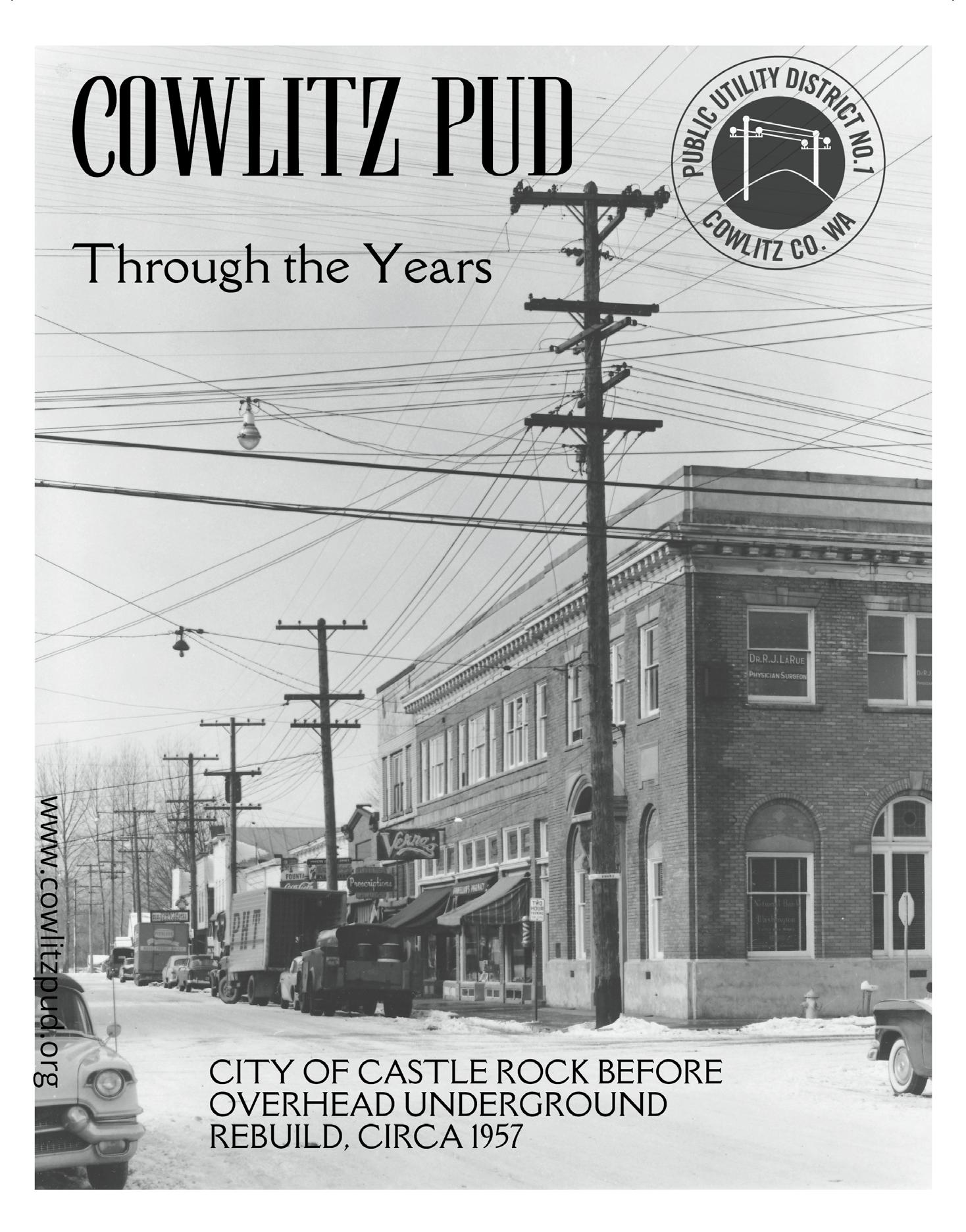

COLUMBIA RIVER READER
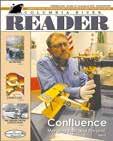

LEWIS AND CLARK REVOLUTIONIZED
What really — truly — happened during those final wind-blown, rain-soaked thirty days of the Lewis and Clark Expedition’s trek to the Pacific? Southwest Washington author and explorer Rex Ziak revolutionized historical scholarship by providing the answers: day by day and week by week. We’re delighted to offer In Full View, and Rex’s other two books, one with an extraordinary fold-out map, as our inaugural offerings from CRR Collectors Club.
IN FULL VIEW
Rex Ziak $29.95
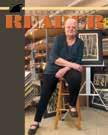
A true and accurate account of Lewis and Clark’s arrival at the Pacific Ocean, and their search for a winter camp along the lower Columbia River.
EYEWITNESS TO ASTORIA Gabriel Franchére $21.95


The newly edited and annotated by Rex Ziak version of Franchére’s 1820 journal, Narrative of a Voyage to the Northwest Coast of America in the Years 1811, 1812, 1813 and 1814, or The First American Settlement on the Pacific.



DOWN AND UP Rex Ziak $18.95
A unique fold-out guide mapping dayby-day Lewis and Clark’s journey from the Rockies to the Pacific Ocean and back.
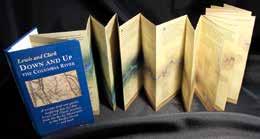
SUBSCRIPTION
issues $55. SUBSCRIPTIONS MAKE THOUGHTFUL GIFTS... FOR YOURSELF OR FOR A FRIEND!
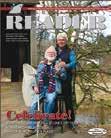
THE TIDEWATER REACH Field Guide to the Lower Columbia River in Poems and Pictures


By Robert Michael Pyle and Judy VanderMaten. In three editions:

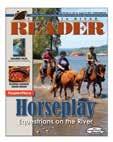

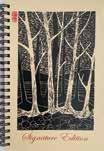
Boxed Signature Edition Color and BW $50;
Collectors Edition,Trade paperback. Color and B/W $35
• Trade paperback B/W $25
DISPATCHES FROM THE DISCOVERY TRAIL
A Layman’s Lewis & Clark
By Michael O. Perry.
In three editions:
• Boxed Signature Edition, Color and BW with Souvenir Bookmark $50
• Collectors Edition,Trade paperback. Color and B/W $35
• Trade paperback B/W $25
call 360-749-1021
As we go to press, early signs indicate Fall is on the cusp.
Many readers, I know, share my love of Fall and join me in naming it our favorite season. Among the four, this one brings us an especially rich sense of transition.
For me, this change from summer is welcome ... back-to-school, crunchy leaves, fireplace ablaze, candles glowing, cozy evenings indoors, with pumpkins on the porch and pot roast in the oven.
But if you aren’t quite ready for the arrival of Fall, perhaps you can forestall it by throwing a blatantly summery party. Tracy’s recipes and story, “Baja in You Backyard,” will inspire you (page 12). There’s still time. Temps in September so far have persisted in the high eighties, even into the nineties.
Marc Roland, a gentle and thoughtful soul, often offers pearls of wisdom for life, writing about winemaking, metaphorically. In this month’s column (page 32), he talks about Fall:
Things are changing— a sense that a transition is happening—subtle but palpable...In the wine world, it is the most monumental time. It is a lot like life. So fragile. So unpredictable. But certainly doable. In fact, it is questionable if our humanity would exist if not for the challenges of living. Autumn teaches us that, in a way no other season can.
Marc pays tribute this month to a particular wine: You may fall in love, again, with a perfect transitional wine: Chardonnay! Clink. Cheers!
Queen Elizabeth’s passing and the transition from her incredibly long and admired reign to King Charles III is grand theatre. I envy the British for this embellishment to their lives. Especially if somehow the monarchy fulfills in their culture the same need that makes Americans’ fascination with Hollywood and the “celebrity” frenzy so prevalent in ours. The Brits’ trumps our fixation, so to speak, with their more dignified royal customs — all those elegant traditions, and so civilized. Mind the gap.
I’ve finally forgiven Charles for Diana — after watching Camilla all these years conduct herself with total class, and aging gracefully — and feel more empathetic toward Charles if his growing up was accurately depicted in the Netflix series “The Crown.”
So… my best wishes to Charles. God Save the King.
Please have an enjoyable Fall (unless you have other plans). And may John Keats’s ode “To Autumn” (at right) speak to you.
Sue Piper
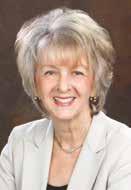 To Autumn by John Keats
To Autumn by John Keats
Season of mists and mellow fruitfulness, Close bosom-friend of the maturing sun; Conspiring with him how to load and bless With fruit the vines that round the thatch-eves run; To bend with apples the moss’d cottage-trees, And fill all fruit with ripeness to the core; To swell the gourd, and plump the hazel shells
With a sweet kernel; to set budding more, And still more, later flowers for the bees, Until they think warm days will never cease, For summer has o’er-brimm’d their clammy cells.
Who hath not seen thee oft amid thy store?
Sometimes whoever seeks abroad may find Thee sitting careless on a granary floor, Thy hair soft-lifted by the winnowing wind; Or on a half-reap’d furrow sound asleep, Drowsed with the fume of poppies, while thy hook Spares the next swath and all its twined flowers: And sometimes like a gleaner thou dost keep Steady thy laden head across a brook;
Or by a cider-press, with patient look, Thou watchest the last oozings, hours by hours.
Where are the songs of Spring? Ay, where are they?
Think not of them, thou hast thy music too,-While barred clouds bloom the soft-dying day, And touch the stubble-plains with rosy hue; Then in a wailful choir the small gnats mourn
Among the river sallows, borne aloft
Or sinking as the light wind lives or dies; And full-grown lambs loud bleat from hilly bourn; Hedge-crickets sing; and now with treble soft
The redbreast whistles from a garden-croft, And gathering swallows twitter in the skies.
In this
Columbia River Reader is published monthly, with 14,000 copies distributed in the Lower Columbia region.
Entire contents copyrighted; No reproduction of any kind allowed without express written permission of Columbia River Reader, LLC. Opinions expressed herein, whether in editorial content or paid ad space, belong to the writers and advertisers and are not necessarily shared or endorsed by the Reader.

Submission guidelines: page 36. General Ad info: page 42. Ad Manager: Ned Piper 360-749-2632.

Repairs,
Civilized Living
get a defensive response, but he needs to know. Is there a nicer way to get my point across without the acrimony?
By Judith Martin, Nicholas Ivor Martin and Jacobina Martin



DEAR MISS MANNERS: My nephew opened a new business. He sent a mass text message thanking those who supported him during the process (he never told me about it) and a link to RSVP to his grand opening.

The text also had a link for donations, and those who donated a specific (hefty) amount would be entered into a raffle for a gift. I congratulated him, and he responded with a “thanks” and a copy and paste of his original message.
I have absolutely no intention of attending the opening or sending a “donation.” I sent him a generous wedding gift and beautiful gifts for each of his kids without a thank-you in return, texted or otherwise. I only receive invites to gift-generating events, but he has parties at his home all the time that he posts on social media.
I’m not going to respond one way or another. If he asks, I will say I’m sorry that I cannot attend (without further explanation).
I know his father (my brother) is going to ask me why I’m not going to attend. I intend to tell him that I don’t hear from my nephew unless it is a money-grab event, I never get a thankyou in return, and this is the result. I know that will
GENTLE READER: It depends on what your point is. If it is that nephews should write thank-you notes, then you can stop sending presents -- and, if asked about it, say that it was your impression that your nephew had outgrown gifts from you because he does not acknowledge them.

If your point is that it is not nice to badger your relations into supporting your business, you can answer by saying that you prefer to keep family and business separate -- and while you are very happy for his new business, you reserve your donations for social causes.
If your point is that your brother needs to know what his son is doing, Miss Manners fears that you will have to wait to be asked, as a more direct criticism of his behavior would be impolite.
DEAR MISS MANNERS: When my husband died after a long illness, I received many lovely notes. I answered them all. I was very touched by the kindness, and I felt it helped me recover from my sorrow.
When I hear of the passing of friends or their family members, I usually write to the survivors. Most write back. Some don’t respond. What is the right response to a written letter of condolence?
GENTLE READER: Exactly what your instinct told you.

Miss Manners is aware that many feel it is a burden on the bereaved to have to acknowledge expressions of sympathy. In extreme cases of grief prostration, one of the Is-There-Anything-I-Can-Do? people can be deputized to convey the survivor’s appreciation.
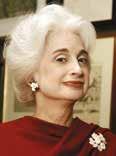
But it is important to acknowledge condolence letters. As you attest, it should be gratifying to know that others cared for the deceased and are sympathetic with the survivor. Writing back is a chance to represent your husband to them, in appreciation not only of their concern, but of what those people meant to him.
And ignoring them often has an unfortunate, unintended consequence. As Miss Manners has often heard from widows (never from widowers), they may be ignored socially after the first intense mourning period. This may be in part because those whose first overtures were ignored conclude that the widow wants to be left alone, and thus cease to importune her.
DEAR MISS MANNERS: I am a young person with recurrent hip pain, and I have considered using a mobility aid -namely, a walking cane. Since I am still young and live with my parents, I feel a bit uncomfortable at the idea of using


DISPATCHES FROM THE DISCOVERY TRAIL
EPISODE 17 The Worst is Yet to Come
By Michael O. PerryInthis episode, we continue the saga as the Corps of Discovery made their way across the Rocky Mountains. When Lewis and Clark learned there was no way across the mountains at Lemhi Pass, east of present-day Salmon, Idaho, the Shoshone Chief told of a trail north of there, used by the Nez Perce Indians to cross the mountains to hunt buffalo. With the help of Toby, an old Shoshone Indian, the Corps made their way to the east side of Lolo Pass, near present-day Missoula, Montana. This 150-mile journey, following the Continental Divide and down the Bitterroot River, took two weeks. The steep slopes and lack of a trail part of the way made it a difficult trip. However, anyone who thought the worst was over was in for a big surprise.
On September 11, 1805, when the Corps left the Bitterroot valley to climb 2,300 feet to reach Lolo Pass, they began the most difficult part of their 4,000-mile journey from St. Louis to the Pacific Ocean. A Nez Perce Indian had agreed to guide them the 160 miles over the mountains but abandoned them after just one day, leaving Old Toby, who had never crossed the mountains, to be their guide.
Much of the land the 33 Expedition members passed over remains unchanged today. Highway 12, across the Idaho panhandle, follows their route to some degree, but there is a Forest Service road that pretty much follows their actual route for most of the way from Lolo Pass to Orofino.
What’s for dinner?
Finding enough deer and elk to feed the men had been difficult for many weeks. The portable soup brought from St. Louis was so rancid the men could eat only small portions. On September 14th, they were “compelled to kill a Colt” to keep from starving. Part of the horse was saved for breakfast and dinner the next day. Things would get worse.
the baggage they were carrying was damaged. Clark’s portable writing desk was broken to pieces in one such accident.
After leaving the river, both water and game were scarce. Fortunately, they found snow banks up to three feet deep on some north facing slopes that could be melted to get water. The remainder of the first sacrificed horse was eaten for dinner that night, along with more putrid portable soup.

Turn up the heat!
Captain Clark woke up at 3am on September 16th to find it snowing. It continued all day, and by evening there was eight inches on the ground. This made a difficult situation almost impossible. Private Whitehouse

“The want of provisions”...
...
It was getting pretty bad by then. They had this stuff made up way back a year and a half before in St. Louis, just add water to make soup, and it was rancid. If they’d had anything else to eat they would’ve eaten it, but they couldn’t even find chipmunks out there. This is out where nothing grows. If you don’t pack your food with you, you die, and that’s what Lewis and Clark were faced with. They had 33 men and nothing. So they ate their horses.”
Rather than following the river all the way, the Nez Perce trail followed the ridge tops. As a result, Toby made a couple wrong turns along the way. On September 15th, they left the valley floor and climbed 3,500 feet to reach the trail far above. At one especially steep section, several pack horses fell backwards and rolled 100 feet down onto the rocks. Up to a dozen men were needed to help those poor animals back up the hill. None of the horses died from the many falls, but
wrote, “Some of the men without socks raped rags on their feet…” Following the trail was a challenge, and heavy wet snow falling off tree branches kept everyone soaked. Clark wrote, “I have been wet and as cold in every part as I ever was in my life, indeed I was at one time fearfull my feet would freeze in the thin mockersons which I wore…” A second horse was killed that night to feed the men.

Captain Lewis’s Branding Iron
About 4 x 5.5 inches and about 1-1/2 inches in depth, the branding iron carries the information “U. S. Capt. M. Lewis” at the top, with a large open rectangle below. The brackets on each side were probably attached to a short handle. The iron was primarily intended to brand trees, establishing the passage of the Corps. The open rectangle permitted other information, such as a date, to be added by carving. The branding iron was used to mark the grave of Sgt. Charles Floyd who died from a burst appendix in 1804, and may also have branded supply boxes and barrels at the outset of the journey. The horses left in the care of the Nez Perce Indians were branded in October 1805, possibly with this branding iron. Joseph Whitehouse wrote,“Got up our horses and cropped their fore mane, and branded them with a Stirrup Iron on the near fore Shoulder, So that we may know them again at our return.”

The branding iron accompanied the Corps of Discovery to the mouth of the Columbia River, where it was used to brand trees and so mark the group’s successful transcontinental trek. On the return trip in 1806, the iron was likely traded to Indians in the vicinity of Celilo Falls. The branding iron was found among rocks along the Columbia’s north shore, west of The Dalles, in the early 1890s. It was given to Philip Jackson, publisher of the Oregon Journal, who donated it to the Oregon Historical Society in 1941.
Michael Perry enjoys local history and travel. His popular 33-installment Lewis & Clark series appeared in Columbia River Reader’s early years and helped shape its identity and zeitgeist. After two encores, the series has been expanded and published in a book. Details, pages 2, 43.

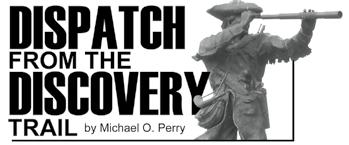

dispatches
A LAYMAN’S LEWIS & CLARKMuch time was lost when the men had to go searching for horses that wandered off each night. They couldn’t afford to eat horses and lose them too. Snow continued the next day, but by evening it stopped and temperatures rose, melting the snow and making the trail muddy and slippery. That night, a third horse, “being the most useless part of our Stock… fell a Prey to our
appetites.” Breakfast on September 18th finished that horse, and another horse wandered off not to be found. Morale was very low; years later, Clark wrote, “The want of provisions together with the difficuely of passing these emence mountains dampened the Spirits of the party.”
The end is near Clark and a small party had gone ahead to seek food. On September 18th, Clark realized they had crossed
“









Lewis & Clark
from
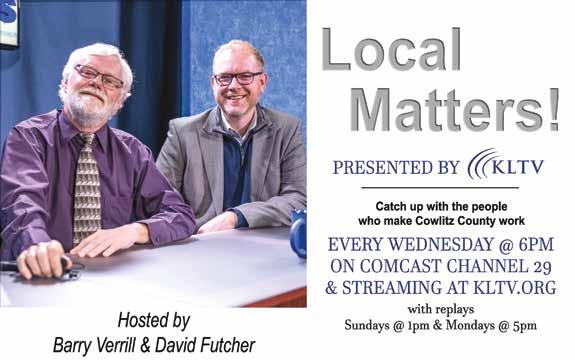
5
the worst of the Rocky Mountains. He wrote, “from the top of a high part of the mountain… I had a view of an emence Plain and Leavel Country to the S W. & West at a great distance.” A lost Indian horse found grazing in a meadow became breakfast for Clark’s party, with the remainder of the carcass hung in a tree for Lewis’ party to find the following day.
The trail was terrible. Robert Frazier’s horse fell off a steep precipice and rolled 300 feet down the drop-off into a creek. Fortunately, the horse missed the rocks and landed in a pool of water. After the heavy load of ammunition was taken off the horse, it “arose to his feet & appeared to be but little injured, in 20 minutes he proceeded with his load.”
Is there a doctor in the house?
On September 20th, Clark arrived at a Nez Perce village, east of presentday Orofino, Idaho. The warriors were away looking for enemy Indians, but the women gave Clark and his party all the dried salmon and boiled quamash (camas) roots they wanted. They ate too much and Clark wrote, “I find myself verry unwell all the evening.”
When Lewis and the rest of the men arrived two days later, Clark “cautioned them of the Consequences of eating too much.” The next morning, Lewis and several men were very sick. Clark broke out the bottle of Dr. Rush’s bilious pills, better known as “Thunderclappers.” These pills, consisting mostly of chlorine and mercury compounds, did an excellent job of cleaning out their intestinal tracts, something Lewis and most of the men didn’t need since they were sick with acute diarrhea for over a week. What made everyone so sick? Was it bad water, bacteria in the dried salmon, or the roots they ate? We’ll never know.
Extreme hunger
The men managed to shoot some deer, but another perfectly good horse was sacrificed for a meal on October 2nd. A few days later, some of the men began buying dogs from the Indians to eat. Captain Clark wrote, “all the Party have greatly the advantage of me, in as much as they all relish the flesh of the dogs.” The Nez Perce had many dogs, but since they never ate them, they disapproved.
The Nez Perce chief drew a map for Clark showing the rivers leading to the ocean. He indicated one place, present-day The Dalles, Oregon, might require portaging around the rapids. Everyone was excited at being able to build dugout canoes and ride the last 500 miles to the Pacific. They only had small axes, so it must have been difficult to fall the three- or four-foot diameter pine trees. The Indians showed them how to use hot coals and fire to help hollow out the canoes. It took ten days to build five canoes.
The Nez Perce had exceptionally nice horses. They were the only Indians to practice selective breeding, which had produced the Appaloosa. Since the Corps would not need their 38 remaining horses to get to the ocean, arrangements were made to have the Nez Perce take care of them until the following spring. Lewis branded each horse and cut off their manes. If the Corps failed to return, the horses would belong to the Indians.
Finally: Downhill all the way
Dugout Canoes
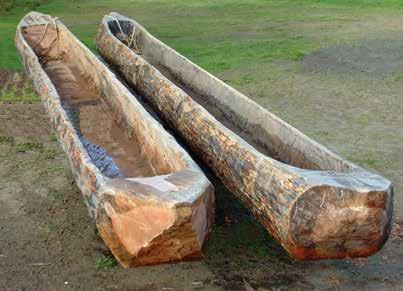
The Indians showed the Corps members how to use hot coals and fire to help hollow out the canoes. It took ten days to build five canoes. They were notoriously hard to manage and unstable. It’s a marvel that, fully laden with supplies and men, they stayed afloat, let alone made their way to the mouth of the Columbia. Even the Indians were skeptical, lining the banks at a hazardous river passage near today’s The Dalles, waiting to salvage cargo and rescue drowning men. The canoeists and their primitive craft somehow survived that passage, and many others.
On October 7th, the 33 members of the Expedition set off in their canoes down the Clearwater River. The canoes were packed full and took in water at many rapids while the men learned how to navigate them downriver. Sergeant Ordway described a near disaster a day later, “One of the canoes Struck a rock in the middle of the rapid and Swang round and Struck another rock and cracked hir So that it filled with water. The waves roared over the rocks and Some of the men could not Swim. Their they Stayed in this doleful Situation until we unloaded
one of the other canoes and went and released them.” Unlike the failed Iron Boat Experiment at Great Falls, pitch from the plentiful pine trees was available and used to repair the leaks in this canoe. The Shoshone Indian guide, Old Toby, and his son disappeared on October 9th. The Nez Perce saw them running eastward toward Lolo Pass. Clark had not paid Toby, so he tried to get the Nez Perce chief to track them down. The chief told Clark not to bother since Toby would be robbed of anything he had as he passed through Nez Perce camps. In 1806, on their return trip, the captains were told Toby had taken two of the Expedition’s horses as payment for his services. Toby was never seen or heard of again, but he most likely had saved the Corps from death by leading then to and through Lolo Pass.
Welcome to Washington
On October 10th, the Corps reached the confluence of the Clearwater and Snake Rivers at present-day Lewiston, Idaho. It took six more days to travel down the Snake River to reach the Columbia River at present-day Pasco, Washington. Private Whitehouse said the water flowed “swifter than any horse could run.”
Traveling with the current sure beat the months of rowing, poling, pulling, pushing, and carrying the boats up the mighty Missouri.
Even though the Snake River has been tamed with four dams in Washington, you can still get a feel of the canyon by driving south out of Kahlotus towards Pasco; take Route 263 down into Devil’s Canyon. Stop at Windust Park, just downstream from Lower Monumental Dam, to fully appreciate the Snake River Canyon. Continue driving along the river until you come to Burr Canyon and return to the Pasco-Kahlotus Highway.
WELCOME TO DOWNTOWN
Shop, Dine, Relax ... Thank you for buying local and supporting small business!




Very large
The Broadway Gallery

Where to find the new Reader


It’s delivered all around the River by the 15th of each month. Here’s the list of handy, regularly-refilled sidewalk box and rack locations where you can pick up a copy any time of day and even in your bathrobe:
LONGVIEW U.S. Bank Post Office
Bob’s (rack, main check-out)
In front of 1232 Commerce Ave
In front of 1323 Commerce Ave
YMCA
Fred Meyer (rack, service desk) Teri’s Grocery Outlet
Fibre Fed’l CU - Commerce Ave Monticello Hotel (front entrance) Kaiser Permanente St. John Medical Center (rack, Park Lake Café)
LCC Student Center
Indie Way Diner Columbia River Reader Office 1333 14th Ave. (box at door)
Omelettes & More (entry rack) Stuffy’s II (entry rack)
KELSO
Visitors’ Center / Kelso-Longview Chamber of Commerce

CLATSKANIE Post Office
Mobil / Mini-Mart
Fultano’s Pizza
WESTPORT Berry Patch
RAINIER Post Office Cornerstone Café Rainier Hardware (rack, entry) Earth ‘n’ Sun (on Hwy 30)
El Tapatio (entry rack)
Grocery Outlet Senior Center (rack at front door)
DEER ISLAND Deer Island Store

COLUMBIA CITY - Post Office
WARREN Warren Country Inn
Longview Outdoor Gallery Unique sculptures along the sidewalks of Downtown Longview, both sides of Commerce Ave.
KALAMA

Fibre Fed’l CU Kalama Shopping Center corner of First & Fir McMenamin’s Harbor Lodge
WOODLAND
The Oak Tree Visitors’ Center Grocery Outlet Luckman Coffee Antidote (rack)
CASTLE ROCK
Lacie Rha’s Cafe (32 Cowlitz W.)

Parker’s Restaurant (box, entry) Visitors’ Center 890 Huntington Ave. N., Exit 49, west side of I-5 Cascade Select Market
RYDERWOOD Café porch
TOUTLE Drew’s Grocery & Service

ST HELENS Chamber of Commerce Sunshine Pizza St. Helens Market Fresh Olde Town: Wild Currant, Tap into Wine, Molly’s Market Safeway


SCAPPOOSE Post Office Road Runner Fultano’s Ace Hardware
WARRENTON, OR Fred Meyer
CATHLAMET Cathlamet Pharmacy Tsuga Gallery
Cathlamet Realty West Puget Island Ferry Landing
SKAMOKAWA

Skamokawa General Store
NASELLE Appelo Archives & Café Johnson’s One-Stop

Re-discovering Carousel JOY
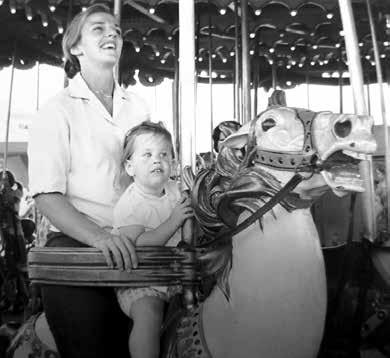
Albany showpiece delights all ages

Sometimes luck puts you on the road to a place you never considered visiting. During dinner at the Oregon coast with my husband, our tablemates extolled their city’s crown jewel: the Albany Carousel. The next day, we adjusted our driving route and soon found ourselves merrily going around. We bought our ride tokens ($2 each), then boarded and selected our seats. Uncertain if we could still swing a leg over the back of a horse – even a wooden one – we chose a bench. As the carousel began and the music started, a clock magically turned back 60 years.
Story and photos by Dayle OlsenMy carousel-riding days trace back to southern California, where my parents would take me to Griffith Park. Later, growing up in Tacoma, it was a treat to ride the antique carousel at Point Defiance Park.
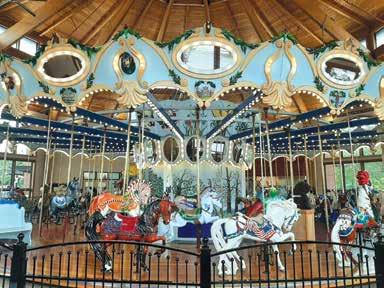
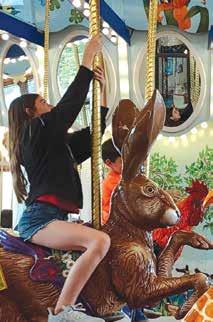
The Albany Carousel is truly special. One woman’s inspired idea gained support among Albany officials, volunteers, and craftspeople 20 years ago as a unique attraction to draw visitors.
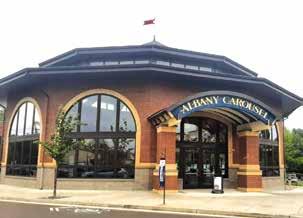
Each animal represents hundreds of hours of hand carving, painting, and finishing. The building which houses the carousel includes a museum, carving room, café, and gift shop. In August 2022, the carousel celebrated its fifth birthday.
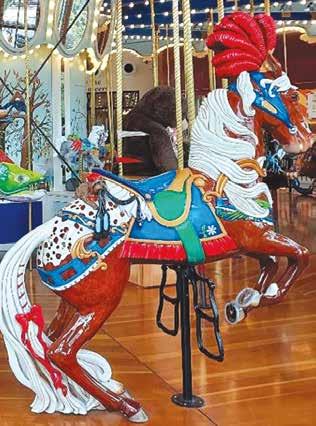


At just an hour south of Portland, it’s an easy day trip. The historic district with art galleries, shops and restaurants is one block from the carousel. The Historic Carousel & Museum, 503 1st Ave. W, Albany, Ore., operates Wednesday through Sunday, 11am–4pm. See website at www.albanycarousel. com for events and holiday closures.
Dayle Olson is a WordFest contributor, serves on the board of The Writer’s Guild of Astoria and is a member of Willamette Writers. Her poem, Water Highway, was one of eight selected statewide by Humanities Washington for inclusion in Washington Poetic Routes. Her short stories have appeared in the Seaside Library anthology (2019, 2020). She makes her home in Cathlamet with her husband David and one opinionated cat.
MEDICAL

New Tool for Finger Treatment
 By Jim LeMonds
By Jim LeMonds


Hand-wrist specialist A.J. Lauder of Longview Orthopedic Associates is using a new surgical technique designed to aid patients suf fering from arthritis of the finger joints. Known as MCP (metacarpophalangeal) joint arthroscopy, the procedure makes use of a NanoScope only 1.9 milimeters wide. “It’s somewhat like knee arthroscopy,” Lauder said, “but everything is much smaller.” Hand surgeons had been frustrated because — prior to the availability of the NanoScope — the only scopes available were intended for wrist arthroscopy. “Just as you are probably imagining, the equipment was too big for small finger and thumb joints,” he said.
Dr. A.J. Lauderhealing and avoiding a more compli cated procedure such as joint fusion or joint replacement. It also gives the surgeon and patient a better idea of what they are dealing with — How severe is the arthritis? Is there a fragment that can be removed? Is the joint stable?”
Dr. Lauder completed a hand surgery fellowship at the Univer sity of Washington, later earning board certification in surgery of the hand. He has co-authored nearly a dozen books dealing with the hand and wrist. His primary focus is on wrist arthroscopy, carpal and cubital tunnel releases, treatment of Dupuytren’s contracture and trigger finger, and reconstruction of the hand, wrist, and elbow.
Lauder learned about the procedure while attending training courses in recent years. Since then, he taught other hand specialists about proper use of the NanoScope. Results of this procedure have been good, he said. “The two biggest advantages for patients are rapid

Former R.A. Long High School English teacher Jim LeMonds, now a semi-retired writer, editor, and marketer, rides his mountain bike whenever possible. His published books are South of Seattle and Deadfall. He lives in Castle Rock, Wash.

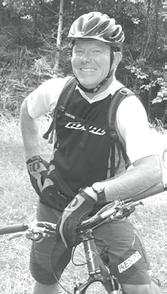


A Different Way of Seeing
THE TIDEWATER REACH
Poem by Robert Michael Pyle Photograph by Judy VanderMaten Field Note by Hal Calbom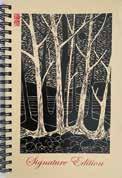

RIVER VILLAGE: CATHLAMET

Cathlamet remains the only incorporated town in Wahkiakum, the smallest of Washington’s counties, and is the site of one of the region’s oldest Native American villages. The name “Cathlamet” (Kathlamet) is said to come from the local Chinookan language referring to the area as a “rocky shore.” Cathlamet became the Wahkiakum County seat in 1854 and was officially incorporated in 1907. The old waterfront still hosts tugboat operations, boat building, and other commercial businesses.
For information

Pencil Shavings
I love the brown butterflies that fly among canyon walls, where the scent is juniper, that flit above San Luis Valley’s floor — Nabokov’s satyrs, Alamosa wood nymphs — flecks of fawn and otter on the wing. How their papery vanes make hope from nothing but nectar and dust.
Yesterday in Astoria, a world away from San Luis, I moved my desk. Discovered in a disused drawer a small paper bag: pencil shavings I’d somehow kept. How could I throw them in the trash now, having saved them all this time? The open window winked. Without a thought, I cast the cedar chips out the window. onto the crabshell breeze.
Pale brown butterflies flickered past the wall, all down to the valley pavement of the street — and for a moment, the scent was juniper.
On this page we excerpt poems, pictures and field notes from our own “Field Guide to the Lower Columbia River in Poems and Pictures,” The Tidewater Reach, by Gray’s River resident and renowned naturalist Robert Michael Pyle, and Cathlamet photographer Judy VanderMaten.
The two dreamed for years of a collaborative project, finally realized when Columbia River Reader Press published color and black and white editions of The Tidewater Reach in 2020, and a third, hybrid edition in 2021, all presenting “a different way of seeing” our beloved Columbia River.
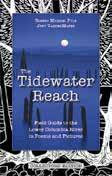
Baja in the Backyard
Story & photos by Tracy BeardLet Tracy’s travels inspire you at home
Traveling is fantastic, and sometimes it’s fun to stay home and recreate memorable experiences from those travels. Music, food, and decorations are terrific mediums for reinventing those moments. Over the last year, I have been to three incredible and unique places in Baja California Sur: Posada de las Flores in Loreto; Esperanza, Auberge Resorts Collection; and Garza Blanca Resort & Spa Los Cabos. The latter two reside near Cabo San Lucas. Follow me on a journey to relive my trip highlights and then, reflect them in your own backyard!
Esperanza, Auberge Resorts Collection

Everything at Esperanza is exceptional, but my favorite moments involved the food. Esperanza is perched above Cabo’s Punta Ballena’s stunning coastline and boasts one of the most resplendent alfresco dining spots in Baja, California, Cocina Del Mar restaurant. My daughter Brittney accompanied me on this trip. Our dinner table sat on the headland’s farthest point above the crashing waves. The night was still, and the soft lights of the restaurant were enough to cast a glow on the white water spraying up the sides of the rocky cliffs below.
We began the evening with a delicious Del-margarita made with lemon, grapefruit 1800 anejo tequila, Grand Marnier, and volcanic salt. The staff brought sourdough bread cooked in a cup that resembled a popover, and a tasty, sweet eggplant butter accompanied the dish.
Our next course was Torre de Mariscos, an assortment of raw gifts from the sea. The platter included Kumiai oysters, chocolate clams, poached blue shrimp, and other offerings alongside several delicious sauces. Everything was fresh and tasted vaguely of the sea, and the presentation was dramatic (pictured, above).
Time with Chef Palacios
My favorite experience was our private event with the resort’s Executive Chef Alexis Palacios. He walked us down to the beach to teach us about the different marine life in the local tide pools. While climbing around, we found crabs, snails, and small fish. Chef Palacios told us that sometimes he finds octopus and larger fish. After poking around for a while, we returned to


the restaurant where we discovered a gorgeous spread of beautifully ripe fruits and vegetables. Chocolate clams, blue shrimp, and fresh tuna were also ready for preparation. The staff handed us aprons, and we stood at stations across from the chef and began our cooking class.
Chef Palacios showed us how to cure raw onion in lemon juice and water. This technique removes some of the onion’s acidity and crunch. We added serrano chili to bump up the flavor. We also made a unique and incredibly delicious guacamole with avocado, cucumber with no seeds, lemon juice, chopped tomatillo, olive oil, salt, and pepper. We also made a fruity pico de gallo with the cured onion, serrano chili, especially ripe cherry tomatoes, chunks of fresh mango and pineapple, olive oil, and fresh cilantro. Lastly, we prepared a mignonette for the raw oysters and a black lemon paste for the tuna and shrimp. It was a thrilling learning experience with the chef.
Garza Blanca Resort & Spa Los Cabos
Windermere Northwest Living

Campbell Associate Broker
The luxurious Garza Blanca Resort & Spa Los Cabos, located between Cabo San Lucas and San Jose del Cabo in Mexico, features an eclectic array of expansive suites and residences, decadent cuisine, numerous activities, eight exclusive swimming pools, special spa indulgences, and a hydrotherapy circuit. The spa, yoga, and tequila
tasting were the moments I treasure the most. Brittney was with me for this trip too.
One morning we attended a yoga class under the resort’s signature orange tree. At our afternoon tequila tasting/cooking class we sampled two 100 percent blue agave tequilas, one blanco and one reposado.

The Spa experience
Spa Imagine at Garza highlights stunning ocean views from the ninth floor. After a few minutes in the sauna, we hit the hydrotherapy circuit, one of the most comprehensive in Los Cabos. Personal chaperones guide clients through timed stays in the vitality pool, cold plunge pool, and high-
from page 12
pressure shower. Hydrotherapy is an immersive experience that helps calm the mind and relax muscles, the perfect preparation for a soothing massage.
After we changed into our robes, the technician dried our swimsuits while we settled in the lounge room and looked out over the Sea of Cortez. We both opted for a deep tissue massage. Our attendants gently placed cucumber slices and a cold, wet washcloth over our eyes. Later, we moved to a massage room with two tables. We sat in chairs and put our feet into bowls while they poured warm water over our toes and gave our feet a gentle scrub. After toweling our feet dry, they left the room, and we got onto the tables.
The masseuses were very skilled. They knew exactly where to apply pressure and how to pull the stubborn knots out from our sore muscles. After excellent massages, we returned to the lounge to enjoy mint chlorophyll water, chamomile tea with honey, and delicious shortbread cookies and nuts.
By Tracy BeardPROVISIONS
ALONG THE TRAIL
Loreto, a Quiet Oasis in Baja California Sur

On my recent visit to Loreto, I was impressed with the lack of “tourism.” The town offered all the essential traveler amenities without all the crowds. Loreto lies between the Pacific Ocean and the Gulf of California in the southern half of the Baja Peninsula. The weather is ideal for outdoor activities, and the turquoise waters of the Gulf will beckon you to fish, surf, boat, dive, and paddleboard. Loreto is rich in history. The state’s breathtaking scenery includes rugged desert terrain, deep canyons, and the occasional welcoming oasis.
A Day on the Bel Gato
The Bel Gato is a gorgeous catamaran with a professional and personable crew. I stepped on board and wanted for nothing the rest of the day. The staff instinctively knew what each passenger needed or wanted before being asked and quickly learned each guest’s cocktail preference profile. They kept the libations coming at a well-balanced pace.
The water in the Sea of Cortez is deep blue with stunning shades of teal. I loved jumping off the side of the catamaran to swim and snorkel. Other guests went for a paddle on the kayak, and everyone took turns on the zodiac.
Bring BAJA to YOUR Backyard!

Recreating specific Baja experiences is easy: play some lively Mexican music, decorate the yard with bright colors and authentic pottery, put together a few fun cold and hot water features, and consider hiring a masseuse or purchasing items to do your own spa day. Whip up one of my tequila cocktails, cook some delicious Mexican cuisine, and, voilà, you are in Baja. Here are a few recipes to get you started.
Elote (Mexican street corn)
4 ears of fresh corn – remove husk and corn silks, rinse with cold water
4 Tbl mayonnaise
1-2 tsp chili powder (I like chipotle chili powder)
Salt to taste
4 oz. cotija cheese
Wash and pat dry the corn. Place cobs on the grill, frequently turning to char. Place charred corn into glass dish. Brush each cob with mayonnaise. Sprinkle with salt and chili powder.
Crumble cotija over all the corn cobs. Cook for three minutes in the microwave and serve.

We saw only one other boat on the water that day, but three different pods of dolphins joined us. Playfully swimming and jumping in front of and alongside the catamaran, these fantastic mammals were a highlight of the day.

Green Iguana
2 oz. silver tequila
1½ oz. Midori ½ oz. fresh lime juice ½ oz. Cointreau
Sugar
Rub two martini glass rims with a lime wedge. Dip the glasses in sugar. Place all remaining ingredients into a cocktail shaker and fill with ice. Shake for 30 seconds. Pour the cocktail evenly into the two glasses and serve.
pounds of pork meat (the head and
add extra flavor to the broth)
lbs semi-coooked pozole corn
cup whole milk
oregano
marjoram
bay leaves
dried or fresh thyme
to taste
to taste
seedless guajillo chiles
dried seedless chiles de arbol
large onions, cut in half
head peeled garlic
½ cup toasted sesame seeds
cup white cane vinegar
wine vinegar is a good substitute)
Condiments:
Lettuce – cut into thin strips
Onion – cut into small dice
Radishes – thinly slice
Lemon wedges
Salt and pepper
Dried oregano Sour cream
Corn tortilla chips and/or broken-up corn tostadas
Tracy Beard writes about luxury and adventure travel, traditional and trendy fine dining and libations for regional, national and international magazines. She is in her seventh year as CRR’s “Out & About” columnist. She lives in Longview, Wash.

Put the meat in a large pot, cover with water. Add 1½ tablespoons oregano, 1 ½ tablespoons bay leaves, and 1½ tablespoons marjoram. Add the whole onion cut in half and half a head of peeled garlic.
Boil for two hours until the meat is almost cooked and soft, add salt to taste, and boil over low heat for another half hour; add more warm water if needed. It’s best to have lots of broth.
In another pot, add the pozole corn kernels, cover with the cup of milk, the remaining herbs, half an onion, and a quarter of a head of garlic. Boil until the grains bursts. Strain the corn and reserve the water.
Put clean chiles in a pot and cover with water. Add half the onion and the rest of the garlic. Once boiling, lower heat and simmer for 5 minutes. Turn off the heat and soak chiles for 10 more minutes.
Next put the chilis in the blender and add the toasted sesame seeds and the vinegar with a bit of cooking water.
Blend until you have a delicate and creamy texture. In another pot, add a little oil and fry this chili sauce; season with salt and pepper to taste. Set aside.
Remove the onion pieces from the meat stock pot. Add the strained corn, and the chili sauce. Boil for 20 minutes. Season with salt and pepper.
Serve the broth on a plate with some pieces of meat and corn and accompany with the condiments. Eat the pozole with tostada pieces or corn tortilla chips and sour cream.

Clatskanie Mini-Storage

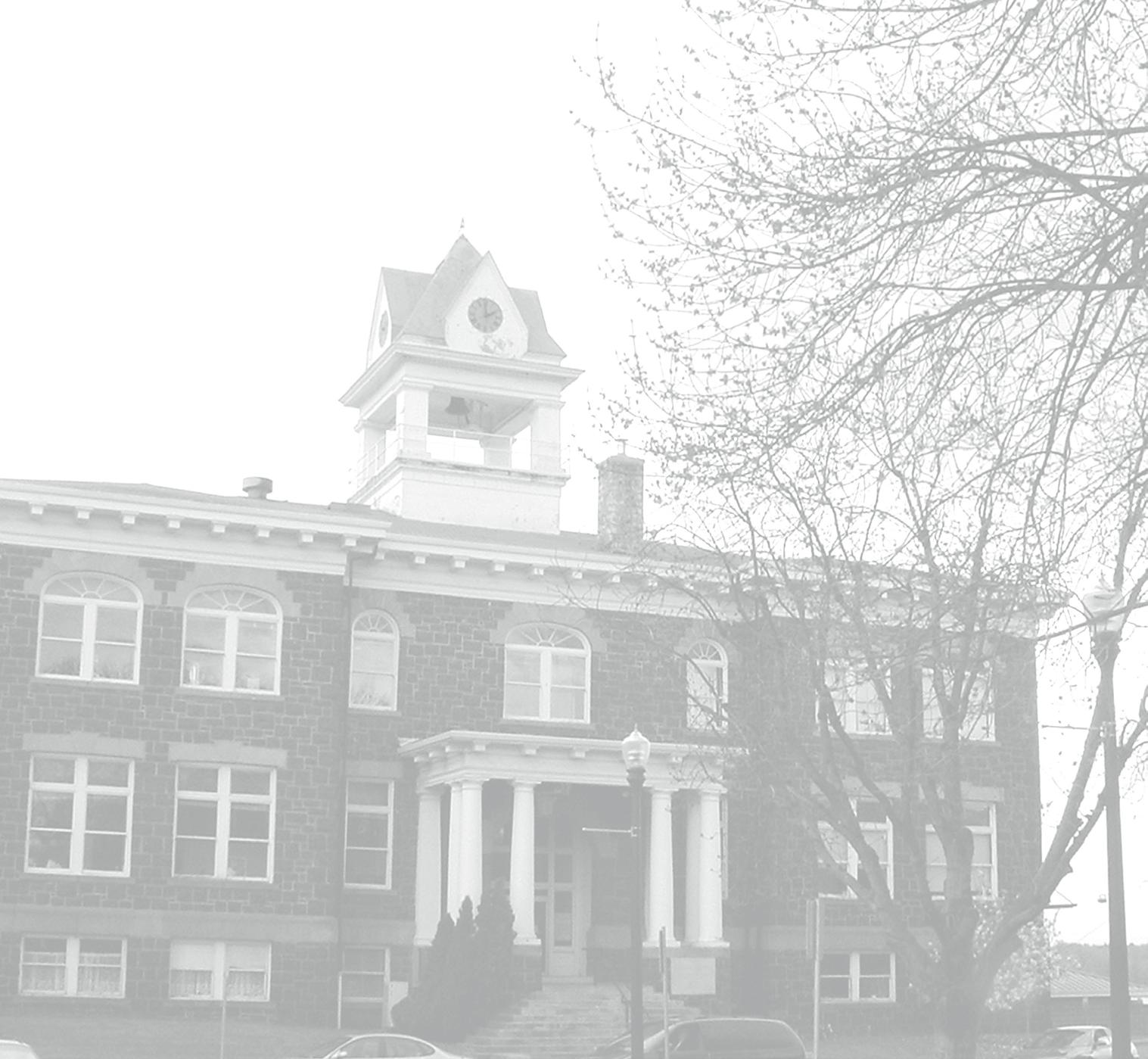
Manager 503-728-2051
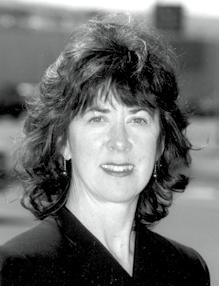







Scandalous Hair Design
and waxing. Specializing in all types of hair color and cuts. 261 S.1st Street St. Helens, OR 503-397-0310



CATERING

A Hidden Treasure in St. Helens
Columbia County Historical Society showcases past
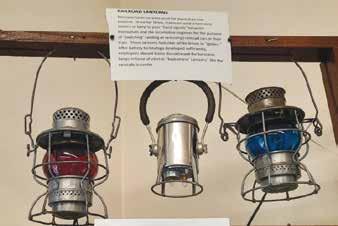
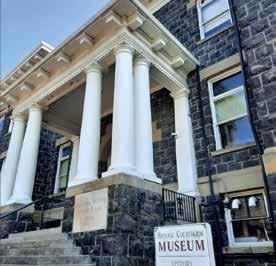
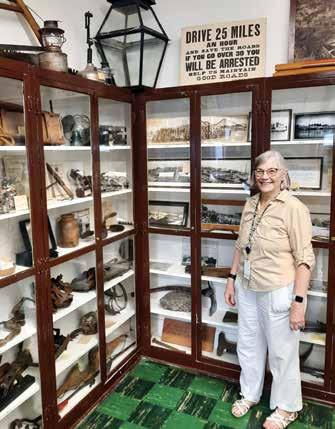

St. Helens, Oregon, is often recognized as a filming location of the popular Twilight and Halloweentown movies, and annually for the Spirit of Halloweentown events every October. Prominently seen in Halloweentown is the Columbia County Courthouse. But take a closer look at the famous Historic Columbia County Courthouse and you will find it is home to the Columbia County Historical Society and Museum Association.
The museum is located on the second floor of the building with exhibits in both the museum proper and within the courthouse corridors. The exhibits in the courthouse hallways add to the visitor’s experience when entering the courthouse and draw attention to the museum located within.
Greeting me at the museum was museum board member and volunteer, Tricia Oberndorf, who
walked me through the displays and described current projects, such as sorting through donations of items gifted to the museum as people cleaned out their attics during the covid pandemic. Another feature that is available courtesy of the museum is a self-guided downtown walking tour. Cards with a QR code are available at the museum to take the tour via your mobile device. You may also access the tour at the museum’s website: www.colcomuseum.org if that is your preference.
On the move
Tricia shared some good news and new plans for the museum. The John Gumm school building just a couple blocks away was recently purchased by Columbia County, and the museum will relocate into the retired school building as part of the plan of reorganizing space. This will give the museum more room for growth and increased visibility to the public. A future Museum Magic will cover the museum and its new location. In the meantime, come visit St. Helens, see the museum, and don’t forget, Spirit of Halloweentown runs from Sept 17 through October 31. The museum is open on Thursdays, noon-4pm, or by appointment by calling 971-225-3971. Admission is free and donations are always welcome.
103) Long Beach, WA. 360-642-2400
800-451-2542
South Columbia County Chamber Columbia Blvd/Hwy 30, St. Helens, OR • 503-397-0685
Seaside, OR 989 Broadway, 503-738-3097; 888-306-2326
Astoria-Warrenton Chamber/Ore Welcome Ctr 111 W. Marine Dr., Astoria 503-325-6311 or 800-875-6807

information about
opportunities: publisher@crreader.com or Ned Piper, 360-740-2632.


A Century on the Lower Columbia ViewLong
PEOPLE+PLACE ~ THEN AND NOW
BACK TO SCHOOL !
Wilbur (right) and Winston (left) use their handsome looks to avoid detention at their father’s alma mater, R.A. Long High School, Longview’s first high school.

was constructed in 1927.
The Lee Family
QUIPS & QUOTES
Selected by Debra TweedyMeetings are indispensable when you don’t want to do anything.
--John Kenneth Galbraith, CanadianAmerican economist and diplomat, 1908-2006
It’s not what you look at that matters, it’s what you see.
--Henry David Thoreau, American writer and philosopher, 1817-1862
The charm of fishing is that it is the pursuit of what is elusive but attainable, a perpetual series of occasions for hope.
--John Buchan, 1st Baron Tweedsmuir, Scottish writer and statesman, 1875-1940
Beware of false knowledge; it is more dangerous than ignorance.
--George Bernard Shaw, Irish playwright, 1856-1950
The sum of the whole is this: walk and be happy; walk and be healthy. The best way to lengthen out our days is to walk steadily and with a purpose.
--Charles Dickens, English writer and social critic, 1812-1870
Richelle Gall
I quote others only in order the better to express myself.
--Michel de Montaigne, French philosopher and essayist, 1533-1592
A classic is a book that has never finished saying what it has to say.
--Italo Calvino, Italian writer and journalist, 1923-1985
The essence of a human being is resistant to the passage of time. Our inner lives are eternal, which is to say that our spirits remain as youthful and vigorous as when we were in full bloom.
--Gabriel Garcia Marquez, Colombian writer and journalist, 1927-2014
A sobering thought: what if, at this very moment, I am living up to my full potential? --Jane Wagner, American writer, director and producer, 1935If they don’t give you a seat at the table, bring a folding chair.

--Shirley Chisholm, African-American politician, 1924-2005
Longview native Debra Tweedy has lived on four continents. She and her husband decided to return to her hometown and bought a house facing Lake Sacajawea.“We came back because of the Lake and the Longview Public Library,” she says.

JOE FISCHER

A year-long feature series written and photographed by Southwest Washington native and Emmy Award-winning journalist Hal Calbom
proDuction notes
people+place
then: the company’s town now: endangered species
celeBration
SPONSOR PARTNERS
PEOPLE+PLACE PARTNERS
Busack Electric Cowlitz PUD
Don & Andrea Cullen
Cutright Supply
Evans Kelly Family Joe M. Fischer Richelle Gall Insurance
The Lee Family NORPAC Michael & Marilyn Perry Perry E. Piper
Port of Longview RiverCities Transit Weatherguard, Inc
LEGACY PARTNERS

Merrilee Bauman Linda Calbom
Elam’s Furniture
The Gebert Family Robert & Pauline Kirchner
Kirkpatrick Family Care
Edward Jones • Nick Lemiere
The Minthorn Family Rodman Realty, Inc.

Holly & GM Roe
Sessions Plumbing Stirling Honda Teague’s Interiors
T he L ongview founders fe LT — and this was among their strongest convictions — that they could create a place where hard work was not just expected; it was honored and reasonably compensated.

They faced a big task. Most mill workers were migratory, restless, and ornery. They regarded mill management as exploitive and their jobs dangerous. The culture of the mill towns, if you wished to call it that, was wild — a traveling circus of single, lonely men behaving very, very badly.
Mr. Long and his colleagues resolved to improve the worker’s lot, and his expectations, in three ways: 1) Replacing the bare bones logging camps with more civilized and stable
The Worker’s Paradise where we’ve Been • where we’re GoinG
The Long View project pairs history with modern context. To celebrate Longview’s 100th

conditions; 2) Encouraging families, not just single men, to call their new city home; and 3) Building the trades — encouraging the development of skilled workmen, not just manual laborers — as the bedrock of Longview’s productivity and prosperity.
For the most part it worked. Thanks in many ways to good timing, the radical unionists like the Wobblies never gained a toehold in Longview. Workers began to consider themselves potential family men, even if housing and amenities were always in short supply. And the notion that one might labor on behalf of a single company, for an entire career, and perhaps even pass that job on to one’s offspring, took hold.
Joe Lane, president, Pacific-Tech Construction, Inc., one of the few general contractors still operating and thriving in Cowlitz County.

Longview became a town always building something. The sounds of hammers and circular saws echoed through the new neighborhoods. Tradesmen and contractors flourished. Unions grew strong and assertive, without breaking the backs of the owners. The banks and groceries and schools and churches emerged and multiplied in support of this powerful working class. Longview as Worker’s Paradise was as much a story as its Biggest Sawmills in the World.
Until — quite gradually and so imperceptibly few even noted it at the time, or even remark upon it now — it suddenly wasn’t.
birthday, Columbia River Reader is expanding its monthly “People+Place” feature to contrast the historical “Then” with the contemporary “Now.”
“It’s important to look back and celebrate the past,” said publisher Susan Piper, “but equally important to track the changes that make us what we are today. How close are we to the founders’ vision? What remains? What’s entirely new?”
Thanks to tremendous community support (see Partner Spotlights, page 26), the Reader will present 12 months of “People+Place Then and Now” reportage, then combine and expand these features into a commemorative book.
The Long View: A Planned
City and America’s Last Frontier written by Hal Calbom, with a foreword by John M. McClelland, III.
The Reader will coordinate with the Longview Centennial Committee, led by Reed Hadley and Arlene Hubble, to publicize civic activities and celebrations (see Centennial Countdown, page 26) and will host a Book Launch Gala in late June 2023.

THEN AND NOW
for All
Work Force
THEN
The founders could control almost anything — except politics and people.
NOW

Longview is a people paradise. But where have all the builders gone?
people+place then
The Company’s Town
It’s simplistic to suggest Longview’s founders underestimated the people who were drawn to their planned city. More fairly, it can be suggested they overestimated the “trickle down” influence of the trends that defined their own Gilded Age.
Their beautifully planned and zoned streets and boulevards derived from models in Paris, Washington, D.C. and Kansas City. Their planners had glorious successes already under their belts and in their portfolios. Kessler, Nichols and others were apostles of the City Beautiful Movement and its avatar, Frederick Law Olmsted, ensconced at Harvard and inspiring the boulevarding of cities all across the country.
Photos:
This page, top: High climber, circa 1925. Loggers were typiclly single, itinerant, and ornery.

Center: Young men running, circa 1924.

Bottom: I.W.W. (Industrial Workers of the World, known as Wobblies) were an unconventional union bound by few rules, whose weapon was the wildcat strike, and whose legacy was often anti-union violence.

Page 19, top: R.A. Long (right) in Rolleo gear, 1926.
Bottom: Paving of Longview streets in the “hexoctagonal” configuration still standing up to wear a hundred years later.
Page 20, left: Rolleo participants, circa 1926.
Right: Construction of worker houses in the “model lumber town” of Ryderwood, 30 miles north of Longview.
Page 21: top right: Schematic and elevation for Longview home, still well above a workingclass family’s paygrade;
Top left: St. Helens Inns under construction, with capacity for 500 working men, one unit still standing today on Longview’s Oregon Way.
Bottom left: Shacks at Longview Auto Park, the “first Longview slum,” in one author’s opinion.
Photo
archive.
On the other hand, most of the pilgrims migrating to Longview were drawn from the school of hard knocks, and from somewhat meaner streets than the Champs-Elysees. And the Northwest lumberjack was of a unique species known almost nowhere else in the world: migratory, rebellious, fiercely independent.
Ultimately the founders’ visions were generous, altruistic, and progressive. But the City on the Hill envisioned by their leader was also utopian, over-reaching, and paternalistic. They misjudged the financial wherewithal of their new citizens; they feared the radical labor movements potentially infecting their workers; and they assumed Longview would be anything but what it ended up: the quintessential Company Town.
There was nothing at all wrong with the people who first came to Longview. Individualistic, free-spirited, ambitious. Optimistic and certainly brave.
The set of issues that would appear around the peopling of Longview arose mostly from the idiosyncrasies of the human species. And the predictable frustrations of a group of high-powered businessmen and industrialists trying to to put Planned People in their Planned City.
Planned People?
Wesley Vandercook, always attuned to the frictions in the machine, complained very early on that most of the people he’d expected to help him build the city simply wanted to sell him something. That in the best American tradition, the Rugged Individualists out there were mainly traveling salesmen.
Mill managers and construction bosses were scared to death of Northwest organized labor, especially the notorious I.W.W., the “Wobblies,” who’d martyred themselves for the
MOST OF THE PILGRIMS MIGRATING TO LONGVIEW WERE DRAWN FROM THE SCHOOL OF HARD KNOCKS
cause of labor in the Everett and Centralia incidents soon dubbed “massacres.” Used to the relatively docile, stable workforces of the South (largely black, and who considered a paying job superior to a history of slavery or indentured servitude) they read the headlines and considered the Russian Revolution relevant. “Workers of the World, Unite!” did not ring well with Long-Bell’s hiring managers.
From the Wobbly halls emanated the traveling delegates and other agitators who did their best to keep the wage slaves in an uproar. No employer officially recognized them, nor did any conventional union. Their weapon was the wildcat strike, always sudden, usually developing violence on both sides. The Northwest was their favorite campaigning ground.
Stewart Holbrook The Far CornerPeople+Place Then and Now
Golden Handcuffs
The Long-Bell real estate gang, bubbling with enthusiasm and flush with preposterous advertising budgets, assumed a home-buying crowd flocking to the new developments waving earnest money in the air with one hand and forking over collateral with the other. Alas, most of the hands that reached out to them were actually empty, looking for a job first, a home perhaps later.
And, ultimately, the founders wrestled with their self-perpetuating dilemma: How do you control, own, and dictate virtually everything, yet build the empowerment and wealth that can free your citizens from the golden handcuffs of the Company Town?
MILL MANAGERS AND CONSTRUCTION BOSSES WERE SCARED TO DEATH OF NORTHWEST ORGANIZED LABOR


Who governs? Who rules? Who adjudicates? Who sets up the banks, loans the money, builds on the infrastructure? Who levies taxes? Suddenly it seemed like building the largest sawmill in the world was a relatively straightforward endeavor.

Landing and Expanding
The first people problem was what to make of the people already there. Kelso was at this time a modest trading center of around 2300 souls. The founders sniffed at it, and soon competed with it, constantly stewing about losing residents to “that town” so rife with the habits and idiosyncrasies of the mill towns they disdained.
Practically, Kelso offered few advantages, being on shallow water and too far from the proposed millsite (these were the days of walking to work, at least until Long-Bell chose, ironically, to locate many of its own developments some distance from the work sites).

Determined to profit from the new land opened by an expanded diking scheme, the company resorted again to the

Congratulations!
Eric and Rebecca Smith owners of Pet Works and, now, the Title Building originally occupied by Hart Drug Co. and Dr. A.B. Shaw, physician-surgeon.
“Old school appeal with wooden floors, and bulk seed barrels. and oversized display windows...”
Michael & Marilyn Perry Proud Sponsor of People+Place Then and Now
People + Place Then and Now
inimitable Vandercook, who quickly allied with four current landowners and launched a buying spree. They offered cash money for land options. Intending at first to keep their motives secret (big mill needs the land) they soon abandoned that ploy and began throwing around greenbacks with abandon. Vandercook described his technique to his colleagues:
That first man was a moderately prosperous farmer who had a place in what is now the middle of Longview. He made it plain immediately that he wasn’t interested in selling out. He admitted he once had an offer of $175 an acre but he wouldn’t consider less than $200 an acre now.
John M. McClelland, Jr. R.A. Long’s Planned CityAt this point Vandercook pulled from his pocket a roll of money wrapped in hundred dollar bills, and offered the farmer $200 on the spot for an option to buy his place within thirty days for $225 an acre. He peeled off two $100 dollar bills and held them out.
I spread it on thick, telling him how we foresaw a great city. Meanwhile, I had Judge McKenney writing up the option. When I’d finished, the farmer reached out and took the two $100 bills. He signed the option.
Wesley VandercookThe strategy proved effective. Vandercook’s team secured 46 more options in three days.

Working Force
The labor issues would take more time, would evolve as mill builders became mill workers, and would eventually result in a generally satisfactory labor / management climate in Longview.

It didn’t begin that way. The founders were shocked by the differences they found between Northwest lumberjacks and the southern workforce:
For one thing, they were migratory. They were not settled family men and for the most part they did not come from an agricultural background. Moreover, for most, the freedom of a migratory life was theirs by choice. They were adventuresome, often rebellious by nature, preferring work in the out of doors to the regimen and confinement of a regular job at a factory.
Lenore Bradley Robert Alexander LongHere timing worked to the advantage of the founders. Although unions and especially the I.W.W. had made
major inroads in the Northwest prior to the twenties, their movements lost strength and momentum late in the decade. The results in Russia were beginning to look less and less like a Worker’s Paradise, and the Wobblies’ adamant stand against United States’ involvement in World War I tipped public and working class sentiments against them.
The Model Lumber Town

Mr. Long and his colleagues made worker welfare a primary organizing principle and featured it in their recruitment. They welcomed the Loyal Legion of Loggers and Lumbermen, not a union in the strict sense, but an organization empowered to discuss working conditions with management. And, as usual, they relied on their own belief in the built environment — in the living conditions they could offer prospective workers and their families — as an inducement.
Providing Clean Power Since 1936 John Day Dam Dedicated September 1968
Northwest hydropower produces no carbon emissions, thereby significantly reducing the total carbon footprint of the region’s energy production.
Proud Sponsor of People+Place Then and Now
THEY BEGAN THROWING GREENBACKS AROUND WITH ABANDON
Proud Sponsor of People+Place Then and Now

“A Trusted Name in the Electrical Industry”
This was more than high talk. In their best “if we build it they will come” tradition, they built a model lumber town some 30 miles north of their planned city. Honoring their most senior executive next to Mr. Long, W.F. “Wild Bill” Ryder, they named it Ryderwood.
Ryderwood was a new idea in the Northwest, where loggers not only had suffered inhuman working conditions but had drifted inefficiently from one camp to another. Each old-time camp had three crews, it was said: one working, one coming, and one going. But Ryderwood had homes for families, a store, a school, a doctor, and a railroad that could take families to Longview.

Virginia Urrutia
They Came to Six Rivers
The Houses of the Town
Because the city wouldn’t incorporate until 1924 (and still would remain a Company Town despite it) initial zoning and housing specifications were Long-Bell’s to set forth, subject to the Company’s well-meaning but paternalistic tradition. Based on the fact that the company workforce in the south had been predominantly black, it was assumed Longview’s new workers would be, as well:
The Long-Bell people were Southerners, used to seeing blacks. They assumed many blacks would choose to live in Longview. They made preparations accordingly, in keeping with the strong racial prejudices that prevailed everywhere at the time.

J.M. McClelland, Jr.
R.A. Long’s Planned City
Benevolently, they thought, they set aside 16 blocks — 30 lots, each 40 feet wide, per block — known as the Highlands Addition, as the “Negro section.” This would allow nearly 500 black families to build or buy homes without, in McClelland’s words, “encroaching on the white neighborhoods.”


The greatest miscalculation made by the planners concerned the number of people who would make their homes in the new city in its first decade. By 1926 the black population had reached only 65.”
J.M. McClelland, Jr.
R.A. Long’s Planned City
Proud Sponsor of People+Place Then and Now
AS USUAL, THEY RELIED ON THEIR OWN BELIEF IN THE BUILT ENVIRONMENT
Furthermore, in the interest of keeping all its neighborhoods segregated by status and financial well-being, the real estate team had set floors on housing prices in its proposed developments — zones oriented to working class, managerial class, and executive class — driving many prospective buyers away at the outset. By March of 1924, many of the millworkers lived elsewhere: although 1,440 company men lived in Longview, 660 lived in Kelso, 312 in Rainier, and four in Kalama. This in a time when “commuting” to work was virtually unheard of.
Making Do in Mudville
Realizing it faced a crisis, the company built five large dormitories, known as the St. Helens Inns, to begin accommodating workers, but housing remained drastically short. The notorious Skidville continued to embarrass those celebrating the grand Hotel Monticello a few hundred yards away. Worse, the many families who couldn’t even afford the $7.50 a week for a room in Skidville, some 500 people, at one point, found refuge at the Longview Auto Park, described as Longview’s “early-day slum.”
The people were living in cars, shacks covered with tar paper (no floors) buildings made out of packing crates, tents made with just a tarpaulin stretched over a pole. Mud was so deep that cars could not travel in lots of places. I asked one lady why the baby was crying and she replied: ‘He hasn’t had anything to eat today, but my husband is out looking for a job now and he will bring some food when he comes home. At least I hope so.’
J.W. Nichols, grocery manager at Longview Mercantile
LONG-BELL CONTINUED TO HEMORRHAGE MONEY


For Richer, for Poorer
Ironically the founders’ egalitarianism often worked against them. Despite the segregations imposed in zoning, their vision was of an idealized future of equal opportunities, enshrining the family and Christian values so strongly ingrained in Mr. Long and his team.

Often they created these people problems by simply aiming too high. The country was already beginning a financial recession in the early twenties. Many of the first migrants were displaced lumber and timber workers, jobless, in the same boat as the company itself. And without realizing it, the founders continued to conceive of worker opportunity in their own privileged terms.
That the Longview Plan addressed such little attention to low-cost housing seems astonishing. But the guiding hand was J.C. Nichols and his experience had been in developing shopping areas and middle- and upper-class residential districts. His orientation stemmed from the City Beautiful Movement and his motivation stemmed from profit, not social reform.
 Lenore Bradley Robert Alexander Long
Lenore Bradley Robert Alexander Long
As a Christian athlete, I glorify God by encouraging my teammates, keeping a positive attitude, and working hard.”
Weatherguard supports the FCA vision: To see the world transformed by Jesus Christ through the influence of coaches and athletes.
 Cole Hardy Basketball Player Lower Columbia College
Cole Hardy Basketball Player Lower Columbia College

Photos:
Page 22, from left: Longview Community Church, seeded by a gift from Mr. Long. Ringing the tower bells, also a gift from the founder / benefactor.
This page, top: Gathering of young people on dock, circa 1924.

Bottom: The Georgian-style library, completed in 1926 and subsidized by Mr. Long its first two years.
Right: Artist’s sketch of the facade and tower of R.A. Long High School, Longview’s masterpiece.

The young Longview was actually a rather poor town in terms of monetary wealth, concludes its great chronicler John McClelland, Jr. Its residents were chiefly wage earners. In 1924, bank deposits totaled $1,027,450. Six years later, they had risen to only $1,750,000.
Acts of Faith
Meanwhile Long-Bell continued to hemorrhage money. And its founder continued his acts of good will and good faith. In December, 1924, Mr Long
came to visit the city and announced that he had news of great importance.
At a dinner that night for merchants and legislators, he announced he was going to spend a million dollars of his own money on further improvements for the city.
He would build a library, two stories high, and by 1926 it arose amidst stately oak trees, resplendent but without books. For two years after, Mr. Long had to support the library in order to keep it
open, according to historian Virginia Urrutia. Later, in a meeting of the Men’s Brotherhood Bible class, which had hundreds of members, he announced plans to donate land for a “community church” and pledged money toward its construction, if members would chip in as well. He would also buy a set of bells for its tower.
Mr. Long’s final significant gift to the city was its magnificent high school, which cost him more than money. To afford it he had to mortgage his very own R.A. Long Building in Kansas City, which embittered his heirs — tired of seeing so much money migrate west — for years after. Urrutia wrote:
Designed by the same architect who had made the Monticello Hotel and the library beautiful, R.A. Long High School facing a spacious grassy campus looking toward Lake Sacajawea, was the pride of the city. Mr. Long himself spoke at its dedication in 1928, but few knew that the gift of three-quarters of a million dollars came from money he had to borrow.

TECHNOLOGY OVER THE YEARS
The electronic delivery of moving images and sound from a source to a receiver, by extending the senses of vision and hearing beyond the limits of physical distance, has had a huge influence on society. Conceived in the early 20th century as a possible medium for education and interpersonal communication, television became by mid-century a vibrant broadcast medium, using the model of broadcast radio to bring news and entertainment to people all over the world.

the Lower Columbia Informer
Perry E. Piper

Proud Sponsor of People+Place Then and Now
Youth and Family Link offers a variety of programs to serve the local community, They focus on under-served needs, avoid duplicating services and strongly practice the belief that agencies must PARTNER to maximize resources.

All Link services and programs are FREE. The organization believes that services and care must be accessible to those who need help.
Please join us in supporting this vital community resource. To learn more, visit
The Evans Kelly Family One Of LOngview’s piOneer famiLies Proud Sponsor of People+Place Then and Now
story, pg. 33
FEW KNEW THAT THE GIFT OF THREEQUARTERS OF A MILLION DOLLARS CAME FROM MONEY HE HAD TO BORROW
Work Force
THEN
The founders could control almost anything — except politics and people.
NOW

Longview is a people paradise. But where have all the builders gone?
people+place now
Endangered Species
Joe Lane’s is a terrific success story.
Joe and his partner Cal Miller formed Pacific Tech Construction three decades ago and continue to prosper. With more than 200 employees spread literally around the world and a regular pipeline into a profitable niche market, federal contracting, they’re on an uptick in a downturning business.
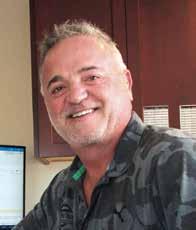
Barely 20 percent of Pacific Tech’s work is new construction. The rest is fixing things — remodels and rehabs and upgrades. The work is sophisticated, focused, and rarely local. The job they’re wrapping up for the Longview Public Schools is a conspicuous exception, spending federal money at the local schoolhouse.
THE SYSTEM IS THE SOLUTION
It’s a sobering sight at an elementary school — newlyinstalled cameras and a sophisticated security system protected by floor-to-ceiling sheets of bulletproof glass.
“It’s a job we wish we didn’t have to do, for sure,” said Pacific Tech’s Jake Kelsey, “but the Feds gave the District half a million dollars to protect school kids, and the contract’s ours.” Assisting school staff in orienting to the system, Pacific Tech team’s affability and good humor countered the explicit purpose of the system: defense against an active shooter intent on doing harm.
““The business is more and more sophisticated,” Joe Lane told me earlier. “If you can’t find your way around a computer and a lot of complicated paperwork you’re not going to compete.” Only five percent of Lane’s business is recruited new; the rest is based on long-term relationships developed with buyers, regulators and contract managers.
Competition is regional, even national, for this kind of work. Pacific Tech maintains multiple offices and competes where it can bring both experience and economies of scale to bear. “I’m sorry to say the old model of a local general contractor with four to five reliable subs is pretty much history,” said Lane, “even local work tends to go to bigger outfits with thinner margins.”
Photos, this page:
Counter-clockwise from top: Slate Miller, Jake Kelsey, and Bryce Miller, of Pacific Tech Construction, review final specifications for the new security system.

Using sophisticated cameras, a single point of entrance, and bullet-proof glass, the system provides security and peace of mind for administrative staff and parents.

At right: Joe Lane runs a virtually global business from a home office in Kelso, employing more than 200 people worldwide.
WHITHER THE TRADES
“If this doesn’t get any better ten years from now you’re going to need a robot to do your electrical, your sheetrock and your plumbing,” said Joe Lane, lamenting the decline in the conventional building trades.
Jim Sessions, whose family has been in the plumbing business in Longview for more than fifty years took it one step further. “But just try rigging a robot to clean out a plugged-up toilet!”
Both men have witnessed a dramatic decline in the available skilled tradesmen and especially in the apprenticeship and job training programs that offer these critical skills.
“We’ve got to get the trades back into the schools — the junior high and high schools,” said Sessions. “Not everybody is on a four year college degree track or wants two hundred thousand in student debt when they’re done.”
“And these are well-paying jobs with great security,” said Lane. “These days you can almost write your own ticket — location, company, conditions.”
I’M SORRY TO SAY THE OLD MODEL IS PRETTY MUCH HISTORY
SUPPLY CHAINS THAT BIND
“I’ve never seen supply chain issues so bad, for the big businesses as well as the little guy.”
So says a Longview wood products executive.. “That just adds pressure all up and down the labor force, for efficiency and quality and honoring contracts.”
Thus, two powerful, global forces influence both Longview’s big and small businesses: the lack of highly trained skilled labor, thanks to recent trends but exacerbated by the pandemic; and catastrophic delays in supply chains across the economy.
“The result is felt every day for the small guys, especially,” added Jim Sessions. “You get the manpower, you can’t find the parts. And the reverse is true. We’ve got all the business we can handle right now because we just can’t get people to come to work for us. And stay with us.”
Photos, clockwise from top:
THE D-I-Y DILEMMA
“Most of the mom and pop shops are long gone,” said Andy Busack, third generation owner of Busack Electric in Longview. “The outof-town contractors gobble everything up, and they’re just about impossible to compete with on price.”
Thanks in some part to the advent of Home Depot, Lowes and the like, contracting has become more a wholesale than a retail business. Do-ityourselfers buy their raw materials the same place small contractors do, at the local home store, and there’s less room for mark-up, overhead, and profit margins when everyone competes on price.
“I have five or six employees at any one time. I need to pay them a living wage and help them support their families,” said Busack. “I can’t possibly compete with national firms with a thousand electricians who can spread their overhead out and underbid me every time.”
What used to be a relationship-based business is now a regional, national, or even global market for skilled employees and materials. And your competition may well be that guy next to you in line at the home improvement center buying lumber at a deep discount.
“It’s getting so I dread coming to work every day lately, this job I love and I’ve done for thirty years, said Busack. “It’s just too much.” “
Lennar Homes. a national company, is building Longview’s first residential subdivision in more than 10 years at Mt. Solo Place, anticipating 160 new residences. Lennar exemplifies the migration beyond the scope of the local contractor / builder: its web site advertises homes available “in 21 states and 78 popular real estate markets.
Tradespeople still at work in Cowlitz County — concrete finisher, electrician, and plumber.




ON THE CHEAP
“We barely do any residential anymore,” said Joe Lane, “ and if we do it’s usually a favor for somebody or we even take a loss on it.”
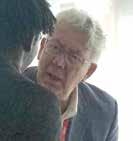
To maintain the relationships that are the glue holding small-town economies together, many contractors and tradesmen are operating at break-even or in the red. “We have all the business we can handle, just can’t get the people to do the work,” said Jim Sessions. Worse, many people hiring in for training, in an applicant-friendly market, disappear after two weeks or go back on unemployment.
“I’m sorry to say it, but a lot of kids just don’t want to do this kind of work anymore,” said Lane.
On this most everyone agreed. “And the irony is, you need those computer and management skills here, too. It’s a lot more than just pounding nails and pouring concrete.”
“The trades are what held the whole system together,” said Andy Busack. “Now it’s just about getting the job done as cheap as you can, wherever you have to go to get it done.”
Hal Calbom is a third generation Longview native who works in public affairs television and educational publishing. This is his fifth year photographing and writing Columbia River Reader’s People+Place feature. Reach him at hal@halcalbom.com.
THESE ARE WELL-PAYING JOBS WITH GREAT SECURITY
IT’S A LOT MORE THAN JUST POUNDING NAILS AND POURING CONCRETE
Sponsor Sessions Plumbing
Their sponsorship is In honor of their parents, from Elisabeth, David, Peter, Mark, and Anne Minthorn
The Minthorns spent most of their married lives in Longview and raised six children. They were proud of the community and contributed to many local causes. Originally from the Midwest, Dr. Minthorn arrived in 1933 to serve patients of the clinic at Longview Memorial Hospital, which later became St. John’s. The couple married in 1939 at Anne’s home in Illinois, then drove cross-country to Longview. They moved to Sacramento, Calif., during World War II while Dr. Minthorn was an Army Air Force medical officer. On their return in 1946, he resumed his family practice. In the 1950s, the couple began collecting Chinese art for their home on 25th Avenue. He died in 1985. Upon Anne’s death in 2015, the collection was donated to Lower Columbia College.
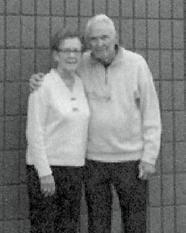
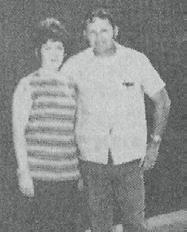
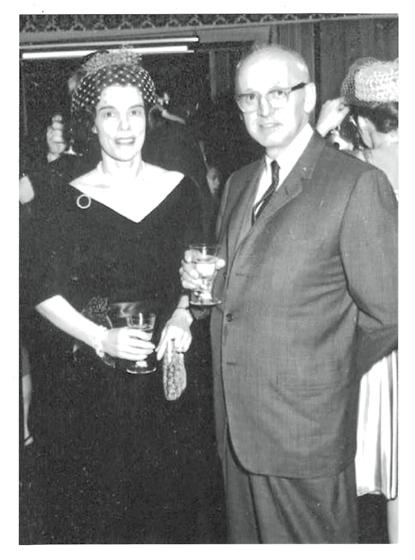
See Minthorn Collection of Chinese Art story, page 29.
1971 2016
I only have one complaint about the plumbing business,” said Jim Sessions, a twinkle in his eye. “We only get called when something goes wrong. Nobody ever calls up just to say hello.”
Add to that the emergency calls on weekends, evenings, and especially holidays where the disposal backs up, and you could say a plumber’s life has its ups (including clog ups) and downs.
“Our father Harold was in the Navy, stationed on Whidbey Island, where he met and married our mother, Adrienne. After his discharge from the Navy, our parents moved back to Kansas for a short time, then returned to a more pleasant climate in this area in 1960.
“Harold was first in business as a partner with Twin City Plumbing and then went in to business with our mother, founding Sessions Plumbing and Heating in 1967. They just loved the area. And all three of us brothers do, too.”
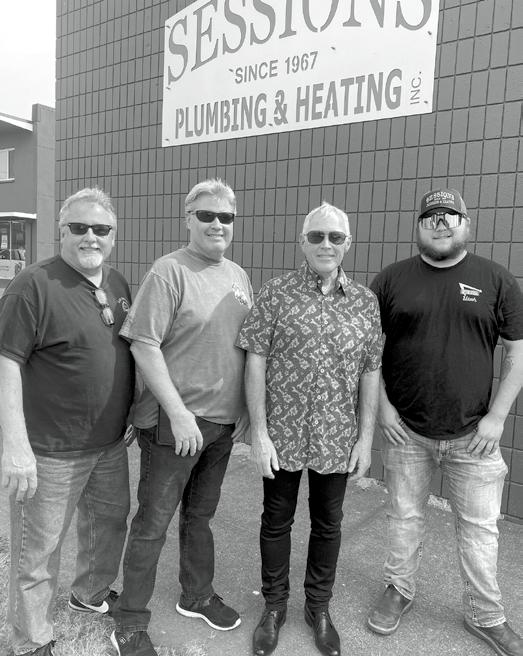
What has been a family business, built on relationships, is threatened by market forces
that at times seem beyond control. “But we’re still here,” said Jim, “and Harold and Adrienne would be happy for the life we still enjoy in Longview.”
“And one of the next generation boys — Steve’s son, Brandon, wants to be a plumber,” said Cindy Sessions, “and that’s good news for all of us. Keep it in the family!”
Volunteers will be needed and appreciated for various events over the coming year.
Please contact:
Students: For ways to earn volunteer hours for school, contact Danielle Robbins. Email: RobbinsD@co.cowlitz.wa.us
WEBSITE
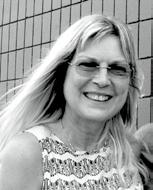
Info • Upcoming Events • Merchandise
Historic Calendars, Centennial Lapel Pins and Pens now available at Kelso Longview Chamber Visitor Center next to I-5 in Kelso, and Longview YMCA.

space
check online for
community
Their sponsorship honors their parents, company founders Harold and Adrienne SessionsSons Jim, Steve, Jerry, and grandson Brandon Sessions, 2022 Dr. and Mrs. H. H. Minthorn, benefactors of the Minthorn International Art Gallery and collection of Chinese art, a gift to Lower Columbia College and the community. The art is permanently exhibited at the Rose Center for the Arts at LCC in Longview.
“Cindy Sessions (Jim’s wife)
Clatskanie, Ore.
Fultano’s Pizza
770 E. Columbia River Hwy
Family style with unique pizza offerings, hot grill items & more!
Dine-in,Take-out and Home Delivery. Visit Fultanos.com for streamlined menu. 503-728-2922




Ixtapa Fine Mexican Restaurant
640 E. Columbia River Hwy
Fine Mexican cuisine. Daily specials. The best margarita in town. Daily drink specials. Dine-in, curbside pickup. M-Th 11am–9:30pm; Fri & Sat 11am–11:30pm; Sun 11am–9pm. 503-728-3344


Rainier. Ore.
102 East “A” Street
Microbrews, wines & spirits

7am–8pm Daily. Inside dining.
Interstate Tavern 119 E. “B” St., (Hwy 30)
Crab Louie/Crab cocktails, crab-stuffed avocados. 17 hot and cold sandwiches. Amazing crab sandwiches. Full bar service. Catering for groups. 503-556-5023. interstatetavern@yahoo. com 503-556-5023
El Tapatio



117 W. ‘A’ Street
Mexican Family Restaurant. Open Fri-Sat 11am-11pm, rest of week 11am-10pm. Full bar. Karaoke Fri-Sat 8-11pm. Patio seating. 503-556-8323.
Longview, Wash.
1335 14th Avenue 18 rotating craft brews, pub fare. M-Th 11am–8pm. Fri-Sat 11am–10pm; Sunday 11am–6pm. Local music coming soon. 360-232-8283. Inside dining See ad, page 43. Follow us on Untappd.


Broadway Barrel Room
1133 Broadway
Family friendly tap house and eatery. 18 taps local craft beverages, hand-crafted soups, sandwiches, flatbread and desserts. Live music on Thursdays. Hours: Tues-Sat 11am–10pm. 360-353-4295. Sun & Mon available for special events.
Bruno’s Pizza 1108 Washington Way. Pizza, breadsticks, wings, salads, fish & chips. WE DELIVER. Four beers on tap. 360-6364970 or 360-425-5220,
The Carriage Restaurant & Lounge
The Carriage Restaurant & Lounge
1334 12th Ave. Open 8am–9pm (sometimes later, call to check). Breakfast, lunch and dinner. Full bar, banquet room available for groups, special events. Happy hours daily 9–11am, 5–7pm. 360425-8545.
COLUMBIA RIVER dining guide
The Corner Cafe
796 Commerce Ave.
Breakfast & Lunch. Daily Soup & Sandwich, breakfast specials. Tues-Sat 7am-3pm. Closed Sun-Mon. 360-353-5420. Email: sndcoffeeshop@comcast.net
Eclipse Coffee & Tea

In the Merk (1339 Commerce Ave., #113) 360-998-2139. Mon-Fri 8am–4pm. Specialty coffees, teas, bubble teas and pastries....drinks with a smile. Takeout and on-site.
Freddy’s Just for the Halibut
1110 Commerce Ave.
Cod, Alaskan halibut fish and chips, award-winning clam chowder. Burgers, steaks, pasta. Beer and wine. M-Sat 10am–8pm, Sunday 11am–8pm. Inside dining, Drive-thru, outdoor seating. 360-414-3288. See ad, page 10.
The Gifted Kitchen

711 Vandercook Way, Longview
“Celebrate, create, inspire.” Soups, salads, sandwiches, wraps, entrees, sides, pot pies, quiche, grazing boxes & more. M-F 11–6; Sat special events only; Sun closed. 360-261-7697.
Hop N Grape 924 15th Ave., Longview Tues–Thurs 11am–7pm; Fri & Sat 11am–8pm. BBQ meat slow-cooked on site. Pulled pork, chicken, brisket, ribs, turkey, salmon. Worldfamous mac & cheese. 360-577-1541.

Kyoto Sushi Steakhouse 760 Ocean Beach Hwy, Suite J 360-425-9696.

Japanese food, i.e. hibachi, Bento boxes, Teppanyaki; Sushi (half-price Wednesdays); Kids Meal 50% Off Sundays. Mon-Th 11-2:30, 4:30-9:30. Fri-Sat 11am10pm. Sun 11am-9pm.
Lynn’s Deli & Catering 1133 14th Ave.
Soups & sandwiches, specializing in paninis, box lunches, deli sandwiches and party platters. Mon-Fri 8-3, Saturday 10-2. 360-577-5656
Roland Wines 1106 Florida St., Longview. Authentic Italian wood-fired pizza, wine, and beer. Casual ambience. 5–9pm Wed-Fri, Sat. 1–9. 360-8467304. See ad, page 30.

Scythe Brewing Company 1217 3rd Avenue #150 360-353-3851


Sun-Thur 11am-10pm, Fri-Sat 11am-10pm
Family-friendly brewery/restaurant with upscale, casual dining, lunch and dinner.
Stuffy’s 804 Ocean Beach Hwy 360-423-6356

8am–8pm. Breakfast, lunch, dinner. American style food. Free giant cinnamon roll with meal purchase on your birthday with proof of ID. Facebook: Stuffy’s II Restaurant, or Instagram @ stuffys2.
Teri’s, 3225 Ocean Beach Hwy, Longview. Lunch and dinner. Burgers, steak, seafood, pasta, specials, fresh NW cuisine. Full bar. Tues–Sat 12Noon–8pm. Sat 5:30–8:30pm.. Curbside pickup. Inside dining. 360-577-0717.

Castle Rock, Wash
Luckman’s Coffee Company
239 Huntington Ave. North, Drive-thru. Pastries, sandwich es, salads, quiche. See ad, page 30.
Parker’s Steak House & Brewery 1300 Mt. St. Helens Way. I-5 Exit 49.
Lunch, Dinner. Burgers, hand-cut steak; seafood and pasta. Restaurant open 1-8pm Tue-Th, 1-9pm, F-Sat. Lounge Happy Hours 4pm. 360-967-2333. Call for status/options.
Vault Books & Brew
20 Cowlitz Street West, Castle Rock. Coffee and specialty drinks, quick eats & sweet treats. See ad, page 34
Kalama, Wash.
Scappoose, Ore.
Fultano’s Pizza
51511 SE 2nd. Family style with unique piz za offerings, hot grill items & more! “Best pizza around!” Sun–Th 11am–9pm; Fri-Sat 11am–10pm. Full bar service ‘til 10pm Fri & Sat. Deliveries in Scappoose. 503-543-5100. Inside Dining.
215 N. Hendrickson Dr., Port of Kalama. A Northwest pub and unique bars serving breakfast, lunch & dinner daily. Info & reservations, bar hours at mcmenamins.com. 8am–midnight daily. 360- 673-9210. Indoor dining, covered outdoor seating, curbside take-out.
St. Helens, Ore.
Sunshine Pizza & Catering 2124 Columbia Blvd. Hot pizza, cool salad bar. Beer & wine. Limited inside seating, curbside pickup and delivery. 503-397-3211 See ad, page 14.
Big River Tap Room 313 Strand Street on the Riverfront. Lunch/Dinner Tue-Thurs 12–8pm; Fri-Sat 12–9pm. Chicago-style hot dogs, Italian beef, pastrami. Weekend Burrito Breakfast, Sat 8-11, Sun 8am3pm. See ad, page 14.


Plymouth Pub 298 S. 1st Street, St. Helens, Ore.
Family friendly, food, 14 tap handles. Open daily 11am-10pm. See ad, pg 14.
Ixtapa Fine Mexican Restaurant
33452 Havlik Rd. Fine Mexican cuisine. Daily specials. The best margarita in town. Daily drink specials. M-Th 11am–9:30pm; Fri & Sat 11am–11:30pm; Sun 11am–9pm. 503-543-3017
Warren, Ore.
Warren Country Inn

56575 Columbia River Hwy.
Fine family dining. Breakfast, lunch & din ner. Full bar. Call for hours.503-410-5479. Check Facebook for updates. Dine-in.
Toutle, Wash.
DREW’S GROCERY & SERVICE
5304 Spirit Lake Hwy (10 mi. fr Exit 49)
24-hour fueling (gas & diesel, card at pump, cash at Jule’s Snack Shack (when open). Red Leaf Organic Coffee. See ad, page 38.
Woodland, Wash.
1350 Atlantic Ave. Rotating craft brews, pub fare. Open M-Th 11am–6pm; Fri–Sat 11am–10pm; Sunday 11am–6pm. 360-841-8941. See ad, page 43.
Luckman Coffee Company


1230 Lewis River Rd. Small batch on-site roasted coffee, breakfast, lunch. Inside seating. M-F 5:30am–6pm, Sat 6am–5pm, Sun 7am–3pm. See ad, page 30.


Restaurant operators: To advertise in Columbia River Dining Guide, call 360-749-2632

“SoCo”
Cruising! Longview residents Tom and Joanna Lee sailed on the USS Michael Monsoor from Astoria to Portland as part of the Fleet Week Rose Festival celebrations in early June. The USS Michael Monsoor is the second in the three-ship Zumwalt class of destroyers.


WHERE DO YOU READ THE READER?

Send your photo reading the Reader to Publisher@CRReader.com. Include names and cities of residence. We strive to promptly acknowledge photos received; if you don’t hear from us within 5 days, please re-send. For cell phone photo, choose the largest file size up to 2 MB. Please pose near the camera; the background scene will still show in the frame behind.
Say “Cream Cheese!” Kalama resident John Holman on a family trip to Philly, in front of Independence Hall, just in time for our nation’s birthday. He said he “got a chance to visit where it all began...What a great city full of history with museums and statues everywhere you look!”

Wild night ahead? Norman Gressett of Rainier, celebrating his recent 90th birthday with family members after a deep sea fishing outing, followed by dinner at his favorite Chinese restaurant. Police cars and a SWAT team converged outside the restaurant, making it a night to remember. Norman’s wife, Beverly thought perhaps word had gotten out that Norman might get a little wild? It was actually an unrelated incident. Left to right: Norman Gressett, ,Jason Dowdy, Beverly Gressett, Wyatt Dowdy, Erik Gressett, and Nicholas Kuzio.
Havens is a group of


independently owned and operated homes.


time!

ASIAN ART COLLECTION PERMANENTLY EXHIBITED AT LCC
Exquisite cultural trove given to the community
Tucked into the second-floor gallery of the Lower Columbia College arts center, an exquisite collection of centuries-old Chinese art awaits an audience.
Seven years after the precious artifacts dating to the Ming Dynasty were first unveiled, few people have seen these colorful works or are aware of them.

The benefactors, Dr. Herbert H. and Anne B. Minthorn, envisioned their gift to the college and the community as a cultural trove for students, schoolchildren and townspeople. At the time, the college hailed the donation.
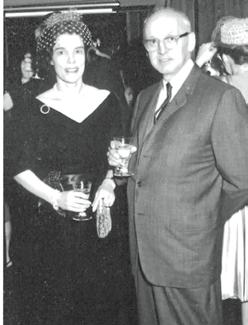
A wide range of styles
The Minthorn Collection of Chinese Art encompasses a wide range of styles— jade ornaments, silk robes, porcelain vases, terra cotta roof ornaments, foo dogs, ancestry painting, landscapes, cinnebar carvings and richly decorated embroideries.
More than 60 objects are mounted in glass display cases and wall hangings. Written explanations and dynastic notations accompany the items.
The oldest piece is a long quan bowl in Chinese porcelain celadon decorated with a lotus flower and ribbed interior from the 14th-15th century Ming dynasty — 2-1/2 inches high and 10-3/4 inches in diameter.

A Mandarin court robe from the 19th century, measuring 60 inches by 48 inches, is decorated with embroidered yellow dragons in clouds chasing flaming pearls of wisdom and other symbolic figures. The blue silk garment is displayed in a glassed frame on the gallery wall.
The ancestor painting depicts a highranking court official and his two wives in full regalia, the women in red robes with over vests bearing their husband’s official insignia. The watercolor image from the late 18th-early 19th century, 31- 1 / 2 inches by 30- 1 / 2 inches, is mounted in a glass frame.
A glazed terra cotta roof ornament — one of five in the collection — depicts a warrior in yellow armor on a galloping horse, an action figure from 19th century China.
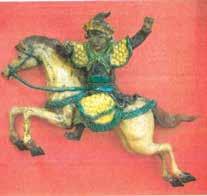
As a cultural and artistic experience, the collection is unique in this area, on the order of Asian art displayed in large city museums. The appeal seems undeniable.
How the Minthorn Collection of Chinese art come to be Starting in the 1950s, the couple acquired Chinese art works from a variety of sources in the U.S. and abroad for display in their
Longview home. Their research, travels and discerning eyes widened the collection through the years Dr. Minthorn worked locally as a family physician, prior to his death in 1985.
Wishing to keep the collection together, Anne Minthorn offered it to Lower Columbia College to support development of the international student program. As part of her estate, the pieces were donated to the college upon her death in 2015, on condition that all items be displayed intact, without sales or removals.
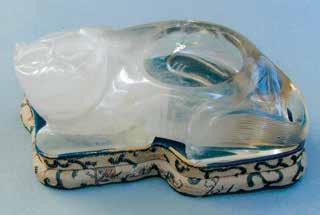
Gratefully accepting, the college established the Minthorn International Art Gallery in 2015 to display the pieces in the second floor of the Rose Center for the Arts.
The Lower Columbia College Foundation described the acquisition as a “unique opportunity to enhance the cultural learning experience for current students, faculty and staff, as well as
the greater community,” The collection was unveiled Sept. 22, 2015, at a gathering for invited guests.
“Through the Minthorns’ generous donation to the college, they have made it possible for many others to enjoy the pieces in their collection and the stories these pieces tell,” a brochure stated.
Art historian Yvette O’Neill Raynham of Longview recalled her role in securing the Chinese collection while she worked in the LCC arts department.
“As I was asked to curate, design and install the Minthorn Collection, I spent a lot of time with Mrs. Minthorn and the artworks themselves,” she said. Ceramics in the collection are among her favorites.
Valuing jade as a precious commodity, the Chinese developed a glaze that took on tones of green and white and is known as celadon, she explained.
Moreover, Chinese blue and white porcelains — like vases, plates, serving dishes and other decorative pieces in the collection — influenced porcelain decoration around the world.
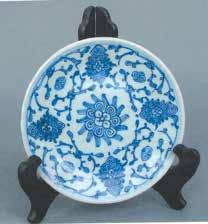

In the years since its opening, lacking sustained publicity, the collection has slipped into virtual obscurity.
An opportunity
Temporary exhibits in the ground floor gallery are publicized on placards and in local media, but not the Asian masterpieces upstairs.
The main gallery is open Tuesday to Thursday 10am to 3 pm for contemporary art on display, according to the LCC website. Perhaps it’s also an opportunity to visit the Chinese treasures atop the stairs.
David Minthorn and faithful companion Buttercup. He’s the eldest son of Dr. H.H. and Anne B. Minthorn. After a career with the Associated Press, he and wife Veronika retired in Longview.

Enjoy driving and being with people? YOU can help!
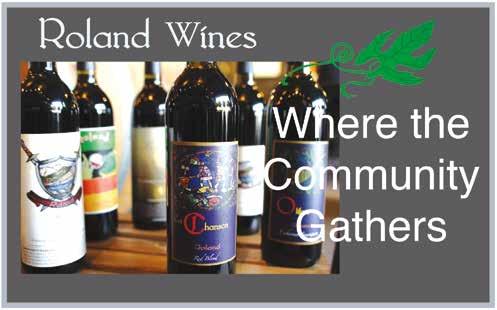
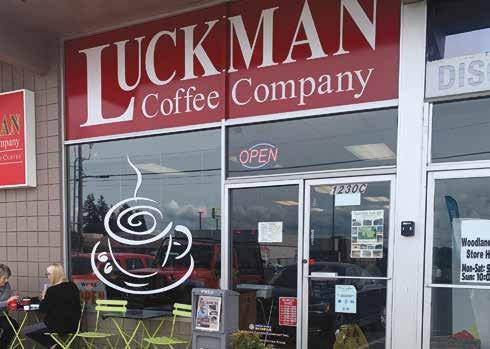


CAP volunteer drivers provide crucial transportation for individuals to out-of-town medical appointments. Volunteer drivers receive tax-exempt mileage reimbursement, currently $.625 per mile, and paid trainings. If you’re interested and have a reliable vehicle and clean driving record, please call: 360- 261-6236 or 360-200-4911

ATTENTION LAND OWNERS
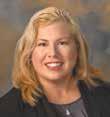

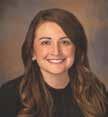


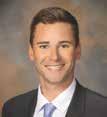


We buy cedar boughs. Do not damage trees. We pay depending on the quality of your trees. We do all the work! Free estimates. For more info call or text

Jorge Martinez 360-751-7723


Looking UP
By Greg Smith Sept. 15 – Oct 20
Fall is here. The summer constellations are moving out to the southwest. The summer triangle is leaving its overhead dominance. The Constellation of Pegasus is starting to take the prominent position in the Autumn sky. It will be in full command by 8:30pm in the evening.

The Evening Sky
By September 25th Saturn and Jupiter are above the Eastern Horizon after sunset. Mars will rise around 10:45 pm in the Northeastern sky. Saturn will be in the southeast bright and easy to spot. Jupiter will be in the East, and quite bright. The best viewing is during New Moon around Sun Sept. 25, when the moon is not in the night sky at all. The next best time is after the third quarter moon (Oct 17th) when the evening night sky is dark for most of the night to do your best viewing.
Crystal
Bruce
Moon Phases:
New: Sun, Sept 25
1st Quarter: Sun, Oct 2nd Full: Sun, Oct 9th
3rd Quarter: Thurs., Oct. 17th
End of twilight - when the stars start to come out: Thurs, Sept 15th, 7:53pm Fri, Sept 30, 7:23pm Thurs, Oct 20th, 6:47pm
The Morning Sky
Venus and Mercury are not to be seen, as they are very near the Sun at sunrise.
Night Sky Spectacle: (M13) the Hercules Globular Cluster
This cluster of stars is a fuzzball object visible in binoculars. It is located at this time of year high in the northwest not far from the very bright star Vega. It is located in the body of Hercules, a four star squarish trapezoid shape (see star chart at left for location of M13). A small telescope will reveal this as a dense pack of stars. It’s quite a beautiful sight to behold. The chart also shows the location of M92, another globular cluster. It, too, is a pretty sight to see.
Possible water world spotted orbiting a nearby star Planet, up to 30% water, to be a top target for James Webb Space Telescope
By Greg SmithAhabitable-zone ocean planet has been discovered orbiting a red dwarf in a binary star system only 100 light-years away from Earth.
Yes, a possible habitable world has been found. Named TOI-1452b, it is larger than Earth with a diameter of 1.67 times that of Earth and a mass 4.8 times greater. Meaning you would weigh quite a bit more there than you would on Earth. Not a place for weight watchers and dieters. This is known as a super Earth, too small to be a gas planet, like Jupiter, but larger than a terrestrial planet like Earth or Venus.
This planet exists in its star’s habitable zone and orbits the star in 11.1 earth days. The star is a red dwarf smaller and cooler than our sun. This allows its habitable zone to be closer in than our habitable zone. This planet is comfortably temperate, and its water is very likely liquid.
This planet is high on the list of objects the James Webb Space Telescope will examine. JWST will be looking at its atmospheric chemical composition and for biosignatures (possible life signs). The planet orbits one of the two red dwarf stars.
The second star (also a red dwarf) is farther away than Pluto is to Earth. So, indeed a very bright star in the night sky and possibly visible in the daytime sky, depending on where the planet is in its 11-Earth day year around its primary star.
A red dwarf is the smallest of the classified stars and the most numerous in our galaxy. An M4 is a mid M class star and has a temperature of about 3200 degrees, (our sun is about 5700 degrees).
This planet has a potential pleasant daily temperature. If it has seasons, it’s way too early to know. An observer on this planet might be able to see our yellow sun in its night sky. How long a day is on this planet won’t be known for some time, but the JWST might be able to figure that out. Its being in the habitable zone might mean that it is not locked to face its sun all the time. It will be a while till we may know how many of its days make one of its years.
Fun fact: In the Star Trek TV series the planet Spock came from, orbited a Red Dwarf star.
Fri 5-9pm Sat 9am-9pm Sun 9am-12

Longview resident Greg Smith is past president of Friends of Galileo. Meet him and other club members at monthly meetings in Longview. For more info about FOG, visit friendsofgalileo.com.

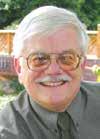
Speakers
(khiunderman79@gmail.com)
(bruce.kelley@gmail.com
Roland on Wine
 Cheers to Chardonnay
Cheers to Chardonnay
Autumn transitions and wine -making, a metaphor for life
By Marc RolandYou can feel it, can’t you? A crispness in the morning air that alerts you of impending change.
A visual second take. Are the leaves still green or starting to change color? Life goes on as usual until the first rain or the first leaves begin to fall. Then we know for sure, that we have no choice but to adjust to it—get out the rakes and make preparations for what’s to come. If nothing more, autumn should teach us that life goes on, and that’s a good thing. Things are changing— a sense that a transition is happening—subtle but palpable.
In the wine world it is the most monumental time. The grapes either ripen to perfection or something happens — like early morning frost or a sudden downturn in the weather. Birds swirling in to rob the farmer of a welldeserved harvest. So many looming perils. But, as in fall, there is an excitement that something special is about to manifest.
A twisting feeling in the stomach of both anticipation and fear. A fear of not being prepared for a harvest that waits for no man, but a joy of the possibilities of what the vintage will bring. Nature presses on with a regularity that is predictable, yet unmanageable, in its precision. All you can do is go with it and try to mitigate it with the knowledge gained over the years. Part science, part intuition. That’s what will get you by.
It is a lot like life. So fragile. So unpredictable. But certainly doable. In fact, it is questionable if our humanity would exist if not for the challenges of living. Autumn teaches us that, in a way no other season can. Spring is
Longview resident and former Kelso teacher Marc Roland started making wine in 2008 in his garage. He and his wife, Nancy, now operate Roland Wines at 1106 Florida Street in Longview’s new “barrel district.” For wine tasting hours, call 360-846-7304.
full of hope, summer is full of life, and winter is the fulfillment of our labors, but autumn is a reminder that life changes, and not always for the better. Only through death and decay can the cycle renew again. Embrace it. Pick the fruit when it’s ready, make the wine the best you can, and accept and rejoice in the results no matter what. Go easy on yourself. Be happy with your effort. Only time can teach you this.
Autumn reminds me of Chardonnay. It is a transitional wine. A way to prepare for the luscious red wines of winter. I know this sounds silly because, of course, we can drink any wine any time. But for me, wine has a connection to experiences and memories that are unique to me.
Chardonnay has a noble story, which starts in Burgundy and flows out to every growing area in the world. It forms the basis for Champagne, so when I drink chardonnay it reminds me of the celebrations that are to come as we look forward to holidays with friends. But the real reason chardonnay is a noble grape is because the wine is loved universally. I prefer chardonnay
that is grown in cooler regions like France and Northern Italy, but you don’t have to go very far to get this style—with citrus flavors, light body and lower alcohol. Try Willamette Valley chardonnay and you may fall in love, again, with a perfect transitional wine: Chardonnay!
Places to go • People to see Good books • Good cheer
Enjoying the Good Life at home and on the road
Organic throughout Longview Centennial photos
Good with coffee, tea, hot chocolate, wine, beer or any other libation!!

ATTENTION LANDOWNERS!



If you are interested in the sale of your cedar and noble boughs (branches), we are willing to pay per pound. WE DO NOT DAMAGE TREES. Feel free to call 360-241-6889 or 360-425-0738. We also do pruning, trimming, general yard clean-up and MORE!

Christmas sale to benefit local families
Asale to benefit Youth and Family Link is set for Friday and Saturday, October 21st and 22nd for gift-buyers to get their holiday shopping done early. The sale is hosted by the Youth and Family Link Thrift Store (located in Downtown Longview) and will be held at Link’s gymnasium at 907 Douglas St. Hours are 9am to 3pm.

Shoppers may discover anything from handmade ornaments to unique vintage finds.
“We’re bursting at the seams” said co-chairperson Michale Husemoen.
“Everything in the sale is clean and in good quality,” and more importantly, every dollar raised during the fundraiser will go directly into the program and back into the community.
This is a chance for the community to come together for a good cause,” said

Krysten Ralston obtained a degree in English from WSU Vancouver. She lives in Longview with her husband, Ryan, 2-year-old Theo, happily awaiting the arrival of a baby girl around Christmastime.

Community Life
By Krysten RalstonEmiley Siters, Youth and Family Link’s Community Program Coordinator. The program provides after school programs, teen mentoring, drug prevention and anger management education, as well as connecting community members to a variety of health and family services.
Siters describes Youth and Family Link as a “resource hub… If we don’t have the resources you need, we will get you in touch with the people and resources you need.”
Siters noted that Youth and Family Link’s services are completely free. “There’s no barrier to access our services,” she explained. “We’re here to help the community and we’re here to help anyone, regardless of income.”
One example is a single mother I spoke to with three children with behavioral issues, who’s been a client of Youth and Family Link since 2018. After leaving an abusive marriage and relocating her family from Kennewick to Kelso, Washington, she felt overwhelmed by her life circumstances and described that time in her life as “very stressful and isolating.”
Her children’s needs prevented her from finding work and, she recalled, it wasn’t until she was connected with Youth and Family Link’s Parent Support Group that she found a sense of community. During Covid, the organization brought weekly food boxes, cleaning supplies, and activities for the children to their doorstep. “Youth and Family Link is the best thing that has ever happened to my family,” she said. “They go above and beyond.”
Husemoen joked that the program is the “community’s best-kept secret” resource, but hopes that will soon change and people
will reach out and get connected to these systems of support. In the wake of the Covid-19 pandemic, the program is busier than ever ensuring that struggling families continue to receive the support and tools, and acquire skills they need, not only to survive, but also to excel.

The volunteers, staff, and clients the program encourage people in the community to attend the Christmas sale with open hearts…and open wallets to invest in social change and a thriving community.
a sculpture in the Longview Public Library by world-renowned artist
Fall for ART! Oct. 22

Monticello Hotel Hearty Hors d’oeuvres No-Host Bar Wall of Wine Raise the Paddle
part
DALE CHIHULY

Fundraising Event

Box 1065, Longview, WA
Team
You
What are you reading?
Monthly feature coordinated by Alan Rose
By Debra StewartCynthia is a devout Catholic young woman who has never had a real boyfriend. She lives with her grandmother and her father who is Catholic, though not as devout as she is. Cynthia has a knack for prayer and seems to take it to a deeper level than most when she goes into a reverie she calls “her spells.”


The pleasure she derives from that quiet place could perhaps be the refuge of any frenzied commuter or harried parent if they would just take the time to seek it out. For Cynthia, it comes as naturally as breathing. She has a few close spiritual friends in the church, including her radical parish priest, who provide encouragement in the pursuit of her faith.
After her grandmother dies, and then her parish priest is killed in a suspicious accident, the content of her reveries intensifies. She believes she is being called by God to become a priest. Thus begins her journey, which eventually leads her to the Vatican in pursuit of her calling.
The story takes the reader along on Cynthia’s radical quest with an astonishing surprise ending. This book is an intriguing summer read for anyone who enjoyed other novels about the Church, such as Dan Brown’s sagas. After reading Vatican Waltz, I wanted more from this unusual author about things quirkily spiritual.

Debra Stewart is a reader and a writer who raised her eight children on a farm on the banks of the Upper Naselle River, a spawning tributary to Willapa Bay. She received her MFA in Creative Writing in 2018. Her love of reading is the main driving force behind her writing. (“They are like favorite twins.”)
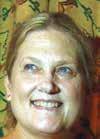
ATTENTION, READERS
Read a good book lately? To be miniinterviewed by CRR Book Reviewer Alan Rose for a future “What Are You Reading?” spotlight, please contact him at alan@alan-rose. com or the publisher/ editor at publisher@ crreader.com.

Low-impact
Exercise Classes
Oct/Nov/Dec
Tai Chi/Qigong Lunch Break Tuesdays – Noon.
Tai Chi for Beginners Tues & Th – 10:00 AM.
Register through
NASM Certified Senior Fitness
Longview Parks & Rec 360 442-5400
Instructor

LaNay Eastman

Tai Chi for Health and Senior Fitness Instructor
TCHI Certified Tai Chi for Arthritis and Fall Prevention (Standing/Seated)


Tai Chi & Qigong for Health and Wellness (Standing/Seated)
The Administration on Aging (AoA) has rated the TCHI Tai Chi for Arthritis and Fall Prevent (TCA) program as the highest evidence-based program for older adults and wellness. More information at www. taichiforhealthinstitute.org.
Drink Good Coffee, Read Good Books
Located in the historic Castle Rock Bank Building
20 Cowlitz Street West Mon-Sat • 8:30–5 360-967-2299

Auto, Home, Flood, Boat, RV, ATV Business & Commercial Insurance & Bonding 360-274-6991



25 A. ST. SW • CASTLE ROCK 866-514-3356

LIFE • DISABILITY • LTCI BUSINESS CONTINUATION FUNDING INDIVIDUAL AND GROUP MEDICAL FAST FRIENDLY SERVICE!
Mt. St. Helens Gifts

1. Where the Crawdads
Sing
Delia Owens, Putnam, $18
2. Verity Colleen Hoover, Grand Central, $16.99
3. Love on the Brain
Ali Hazelwood, Berkley, $17
4. The Seven Husbands of Evelyn Hugo Taylor
Jenkins Reid, Washington Square Press, $17
5. It Ends with Us Colleen Hoover, Atria, $16.99
6. Circe Madeline Miller, Back Bay, $16.99
7. Book Lovers
Emily Henry, Berkley, $17
8. A Court of Thorns and Roses Sarah J. Maas, Bloomsbury Publishing, $18
9. The Song of Achilles
Madeline Miller, Ecco, $17.99
10. The Thursday Murder Club
Richard Osman, Penguin, $17
PAPERBACK NON-FICTION
1. Braiding Sweetgrass
Robin Wall Kimmerer, Milkweed Editions, $20
2. The Body Keeps the Score
Bessel van der Kolk, M.D., Penguin, $19
3. All About Love bell hooks, Morrow, $16.99
4. Fuzz
Mary Roach, Norton, $16.95
5. Finding the Mother Tree Suzanne Simard, Vintage, $17
6. Come As You Are
Emily Nagoski, Ph.D, Simon & Schuster, $18.99
7. This Is Your Mind on Plants Michael Pollan, Penguin, $18
8. The Bomber Mafia
Malcolm Gladwell, Back Bay, $18.99
9. How to Focus
Thich Nhat Hanh, Jason DeAntonis (Illus.), Parallax Press, $9.95
10. The Field Guide to Dumb Birds of North America Matt Kracht, Chronicle, $15.95
BOOK REVIEW
In the Houses of Their Dead: The Lincolns, the Booths, and the Spirits by Terry Alford Liveright Publishing Company $27.95

What we believe is often what we want to believe, where facts become accessories to those beliefs and largely decorative. This accounts for how, say, we can look at a former US president and have such starkly different beliefs about the man (I’m speaking, of course, about Thomas Jefferson—Man of the Enlightenment or paternalistic racist?)
Spiritualism as a belief system swept the United States in the mid-nineteenth century, beginning in 1848, when Margaret and Kate Fox demonstrated an ability to communicate with the dead.
Alan’s haunting novel of the AIDS epidemic, As If Death Summoned, won the Foreword INDIES Book of the Year Award (LGBT category.) He can be reached at www.alan-rose.com.
Top 10 Bestsellers
HARDCOVER FICTION
1. Carrie Soto Is Back
Taylor Jenkins Reid, Ballantine, $28
2. The Ink Black Heart

Robert Galbraith, Mulholland Books, $32
3. Tomorrow, and Tomorrow, and Tomorrow
Gabrielle Zevin, Knopf, $28
4. Lessons in Chemistry
Bonnie Garmus, Doubleday, $29
5. Horse
Geraldine Brooks, Viking, $28
6. The Midnight Library Matt Haig, Viking, $26
7. Babel
R. F. Kuang, Harper Voyager, $27.99
8. Afterlives
Abdulrazak Gurnah, Riverhead Books, $28

9. Sea of Tranquility
Emily St. John Mandel, Knopf, $25
10. A Psalm for the WildBuilt Becky Chambers, Tordotcom, $20.99
HARDCOVER NON-FICTION
1. Atomic Habits
James Clear, Avery, $27
2. Crying in H Mart Michelle Zauner, Knopf, $26.95
3. Happy-Go-Lucky David Sedaris, Little, Brown, $29
4. Atlas of the Heart Brené Brown, Random House, $30
5. The Boy, the Mole, the Fox and the Horse Charlie Mackesy, HarperOne, $22.99
6. I’m Glad My Mom Died Jennette McCurdy, Simon & Schuster, $27.99
7. Life on the Mississippi Rinker Buck, Avid Reader Press/ Simon & Schuster, $32.50
8. Diary of a Misfit Casey Parks, Knopf, $29
9. BAKE
Paul Hollywood, Bloomsbury Publishing, $40
10. Salt, Fat, Acid, Heat Samin Nosrat, Wendy MacNaughton (Illus.), Simon & Schuster, $37.50.
Brought to you by Book Sense and Pacific Northwest Booksellers Assn, for week ending Sept. 4, 2022, based on reporting from the independent bookstores of Alaska, Washington, Oregon, Idaho and Montana. For the Book Sense store nearest you, visit www.booksense.com



CHILDREN’S ILLUSTRATED EARLY & MIDDLE GRADE READERS
1. Creepy Crayon!
Aaron Reynolds, Peter Brown (Illus.), Simon & Schuster Books for Young Readers, $18.99
2. Berry Song Michaela Goade, Little, Brown Books for Young Readers, $18.99
3. Goodnight Moon Margaret Wise Brown, Clement Hurd (Illus.), Harper, $8.99
4. Blueberries for Sal Robert McCloskey, Puffin, $8.99
5. Bluey: The Pool
Penguin Young Readers, $4.99
6. Llama Llama Back to School
Anna Dewdney, JT Morrow (Illus.), Reed Duncan, Viking Books for Young Readers, $18.99
7. Chicka Chicka Boom Boom Bill Martin, John Archambault, Lois Ehlert (Illus.), Little Simon, $7.99
8. Room on the Broom Julia Donaldson, Axel Scheffler (Illus.), Dial Books,$8.99
9. Skin Again bell hooks, Chris Raschka (Illus.), Little, Brown Books for Young Readers, $7.99
10. Grumpy Monkey
Suzanne Lang, Max Lang (Illus.), Random House Books for Young Readers, $8.99
1. The Last Cuentista Donna Barba Higuera, Levine Querido, $18.99
2. Smile: A Graphic Novel Raina Telgemeier, Graphix, $12.99
3. A Wolf Called Wander Rosanne Parry, Greenwillow Books, $7.99
4. Snapdragon
Kat Leyh, First Second, $12.99
5. Super Extra Deluxe Essential Handbook
Scholastic, $14.99, 9781338714128
6. The Dragon with a Chocolate Heart Stephanie Burgis, Bloomsbury Children’s Books,$7.99
7. The First Cat in Space Ate Pizza Mac Barnett, Shawn Harris (Illus.), Katherine Tegen Books, $15.99
8. Ride On Faith Erin Hicks, First Second, $14.99
9. Melissa (previously published as GEORGE)
Alex Gino, Scholastic Press, $7.99
10. Swim Team
Johnnie Christmas, HarperAlley, $12.99
The metaphysical itch that can’t be scratched
They became a sensation, embarking on a lecture tour and sparking a national phenomenon: Séances became popular, mediums proliferated, people found they, too, could channel the spirits of the dead — and all without the Internet!
(Years later, the Fox sisters confessed they were frauds, and launched a new lecture tour exposing charlatans and frauds. Ya gotta admire Americans’ ability to re-invent themselves.)
The White House was not immune to the spiritualist craze, argues Terry Alford, professor emeritus of history at Northern Virginia Community College. The séances in the Lincoln White House were seen by many as “just another quirk of (the) quirky First Lady,” for underlying spiritualism’s popularity was the desire to believe — in the immortality of the soul; in the continuation of consciousness after the death of the body; that the dearly departed are still with us on some nonphysical plane.
This was certainly the case with the president and Mary Todd Lincoln, who lost their beloved son, Willie, in 1862 from typhoid fever. Grief-stricken, they reached out to various mediums, those “halfway between the earthly and spiritual planes of existence.”
Alford suggests that Lincoln was a superstitious man, a fatalist who saw
John (Wilkes Booth) wandered down to the caravan, where he found an old woman to tell his fortune. “Ah, you’ve a bad hand,” the crone commenced. “Trouble in plenty everywhere I look. You’ll break hearts. They’ll be nothing to you. You’ll die young and leave many to mourn you, many to love you, too.” Taken aback, John asked if his destiny was unchangeable.
“You’re born under an unlucky star,” she informed him. “…A fast life, short but a grand one.”
“It is a good thing it is so short as it is so bad a fortune. For this evil dose you expect me to cross your palm?” asked John.
“Young sir, I’ve never seen a worse hand, and I wish I hadn’t seen it…”
-- from In the Houses of their Dead
himself and others living under the hand of Fate. Along with the Lincolns, he tells the story of the equally superstitious Booth family, especially patriarch Junius, once the most famous actor in the country, and his actor sons, Edwin and John Wilkes. But what makes Alford’s account particularly intriguing is the way these two families’ destinies continued to cross: Edwin Booth would save the life of Lincoln’s oldest son Robert; a medium to the First Family
By Alan Rosewho warned Lincoln of his death was also a close friend of John Wilkes Booth; after being shot, Lincoln was carried from Ford’s Theater across the street to the home of William Petersen and placed on a bed that John Wilkes had slept in a few weeks earlier.
We are the only animal who lives by beliefs as much as by bread. Experience shows that beliefs don’t need to be true; they only need to satisfy some deeper need. Among those needs is the yearning to know the unknowable. It is the metaphysical itch that can’t be scratched. So we settle for belief.
St. Stephen’s Church
HOW TO PUBLICIZE YOUR NON-PROFIT EVENT IN CRR
Send your non-commercial community event info (name of event, beneficiary, sponsor, date & time, location, brief description and contact info) to publisher@crreader.com Or mail or hand-deliver (in person or via mail slot) to: Columbia River Reader 1333-14th Ave Longview, WA 98632


Submission Deadlines
Events occurring: Oct 15 - Nov 25 by Sept 25 for Oct 15 issue. Nov 25-Jan15 by Nov 4 for Nov 25 Holiday issue.
Calendar submissions are considered for inclusion, subject to lead time, relevance to readers, and space limitations. See Submission Guidelines below.
farmers markets
Cowlitz Community Farmers Market
9–2, Tues thru Sept; Sat thru Oct 1900 7th Ave, Cowlitz Expo Center, Longview, Wash. www.cowlitzfarmersmarkets.com
Astoria Sunday Market
Sundays • 10–3 thru Oct 9
Downtown on 12th, just off Hwy 30, Astoria, Ore. www.astoriasundaymarket.com
Clatskanie Farmers’ Market
Saturdays • 10–2 thru Sept.
Copes Park. clatskaniefarmersmarket.com
Scappoose Farmers Market
Sats, thru Sept • 9–2. Behind City Hall next to Heritage Park, 2nd St., Scappoose, Ore. www.scappoosefarmermarket.com
Mt St Helens Hiking Club
(E) - Easier: Usually on relatively flat ground (up to 5 miles and/or less than 500 ft. e.g.)
(M) - Moderate: Longer and more elevation gain (over 5 miles and/or over 500 ft. e.g.)
(S) - Strenuous: Long hikes and/or elevation gain (over 8 miles and/or over 1200 ft. e.g.)
Call leader to join outing or for more info. Non-members welcome.
Submission Guidelines
Letters to the Editor (up to 200 words) relevant to the publication’s purpose — helping readers discover and enjoy the good life in the Columbia River region, at home and on the road — are welcome. Longer pieces, or excerpts thereof, in response to previously-published articles, may be printed at the discretion of the publisher and subject to editing and space limitations.

Items sent to CRR will be considered for publication unless the writer specifies otherwise. Writer’s name and phone number must be included; anonymous submissions will not be considered.
Political Endorsements CRR is a monthly publication serving readers in several towns, three counties, two states and beyond and does not publish Letters to the Editor that are endorsements or criticisms of political candidates or controversial issues. (Paid ad space is available.)
Unsolicited submissions may be considered, provided they are consistent with the publication’s purpose. Advance contact with the editor is recommended. Information of general interest submitted by readers may be used as background or incorporated in future articles.
Outings & Events calendar (free listing): Events must be open to the public. Non-profit organizations and the arts, entertainment, educational and recreational opportunities and community cultural events will receive listing priority. Fundraisers must be sanctioned/sponsored by the benefiting non-profit organization. Businesses and organizations wishing to promote their particular products or services are invited to purchase advertising
Sept 17 - Sat • High Rock Lookout (M)
Drive 200 miles RT. Hike 3 miles with 1500’ e.g. to calendar view of Mt. Rainier. Hikers can also follow the Cora Lake Trail another 2.5 miles with a car shuttle.Leader: Bruce (360) 425-0256
Sept 21 - Wednesday
Discovery Trail Ilwaco (E/M)
Drive 135 miles RT. Hike approximately 5-6 miles. The start of the trail is fairly steep for about a half mile, then eases up to a more gradual e.g. The trail mostly paved but some are dirt trails. Leader: Art (360) 270-9991
Oct 1 - Saturday Indian Heaven (M/S)
Drive 180 miles RT. Hike 8 miles out & back with 1500’ e.g. Meadow after gorgeous meadow for a classic Indian Heaven hike. Leader: Pat R. (360) 560-9554
Oct 5 - Wednesday
Seaquest State Park (E)
Drive 36 miles RT. Hike 1 mile boardwalk with views of Mt. St. Helens and then 3 miles of trails with 200’ e.g. through a large Douglas Fir forest. Leader: Barbara (360) 431-1131
Oct 12 - Wednesday
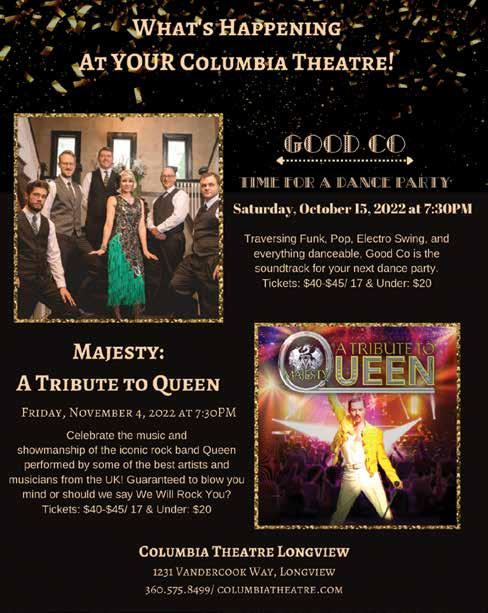
Julia Butler Hansen Refuge (E)
Drive 60 miles RT. Hike 6 miles out & back with no e.g., along the main road and the White Tail to the junction of Steamboat Slough Road. Leader: Dory 213-820-1014
Oct 15 - Saturday Cinnamon Peak (S)
Drive 110 miles RT. Hike 8 miles with 1800’ e.g. through old growth trees and old harvest areas to a viewpoint of Mt. St. Helens. Leader: Bruce (360) 425-0256
Clue on Stage Thru Oct 2. Fri-Sat 7:30, Sun 2pm. Based upon popular board game, adapted from movie of the same name. Tickets $18 Gen’ Admission, $14 Students, Seniors & Veterans, $8 Children 3-12. Stageworks Northwest. 1433 Commerce, Longview, Wash. 360-636-4488. swnw.org.
How to Haiku with Sam Blair Sat, Sept 17, 10am-1pm via Zoom. www.thewritersguild. org. $25 for Guild members, $35 for non-members. Needs-based scholarships available. Email: info@thewritersguild.org

Longview-Kelso Community Concerts Series First concert: Chor Anno, Sept. 18, Rose Center for the Arts, Lower Columbia College, Longview, Wash. www.lkcca.org. Info: Susie K., 360-636-2211.
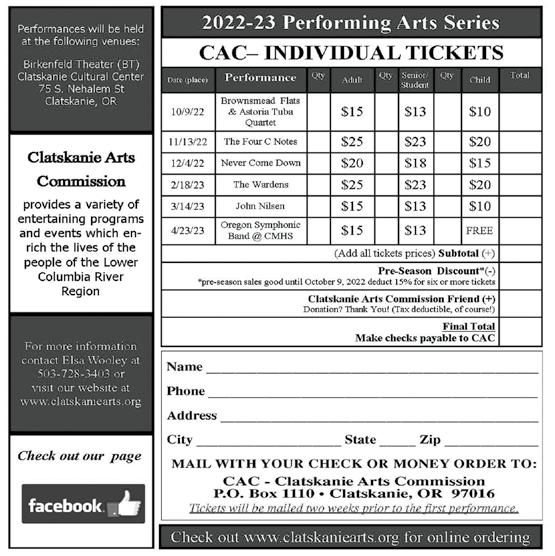
Outings & Events
Author Night Sat, Sept 24, 7 pm. Evening readings at Winekraft, Astoria, Ore. Free, open to the public. John Sibley Williams, Dede Montgomery, Marianne Monson. info@ thewritersguild.org.
Community in the Crossfire: Seeking Civil Dialogue in Uncivil Times (5part forum), Sept 22, 7:3opm, LCC Health & Sciences Bldg,, along Maple St. behind Longview Library. See details, page 41
Calling all vendors Ryderwood 2022 Arts & Crafts Fair, Oct 21-22. 10–4. 30+ vendors, Lunch at the Café 11–2, Bake Sale, Ryderwood Community Hall, 301 Morse St., Ryderwood, Wash. Application: RyderwoodEvents@yahoo.com. Info: 360214-0455 (text).. I-5 Exit 59 to SR-506, west for 90 scenic miles.
The Art of Shirley Bailey thru Sept, Longview Public Library Koth Gallery. Paintings for viewing or purchase, proceeds benefit the Chihuly Sculpture Project.
Art Speaks Volumes Sat, Oct 1, 5-7pm. Longview Library Foundation fundraiser. Bid in Silent Auction on original works of art made by local artists from altered books. Rose Center at LCC, tickets $20 adults, $10 students; includes appetizer and two glasses of wine, beer or sparkling juice. Tickets at Broadway Gallery, Paperbacks Galore, Storyboard Delights and at the door. Proceeds help fund Longview Library projects and outreach programs.
Storytime with Three Authors Sat., Oct 8, 10am. Come enjoy three brand new picture books and meet the authors. Beth Bacon reads Panda Cub Swap; Suma Subramaniam reads Namaste is a Greeting; Rosanne Parry reads Big Truck Day. Kalama Community Building. Free event sponsored by Kalama Public Library. Info 360-673-4568. www. kalamalibrary.com
Rainier Senior Center Holiday Bazaar. Sat. Nov. 5, 9–4. $6 Stew Lunch 11 to 2. 48 West 7th St., Rainier Ore.
New Beginnings” 50+ watercolor paintings by Longview artist Tedde Paterson. Re-opening exhibit, Alcove Gallery at Community Arts Workshop at CAP. 1526 Commerce, Longview. M-Th, 12–3:30pm. Info: Lisa Clark, director 360-425-3430.
BROADWAY GALLERY
1418 Commerce
Join Us for First Thursday Oct 6, 5:30–7pm. New art, refreshments & live music by Brad Dutz!
Longview T-W-F-Sat, 11–4 • Th, 11–6

Visit the Gallery to see new work. For event updates check our website: thebroadway-gallery.com, at Broadway Gallery on Facebook, and broadway gallery longview on Instagram.
Featured artists: Sept: Gallery member Weylan Johnson, “Housescapes;”
Guest artist Vicki Green (glass) October: Gallery members Debra Chase (new paintings) and Mary Kohlschmidt (jewelry).


Help celebrate our 40th Anniversary Sat, Sept. 17, 11–6 Live music all day, refreshments & drawings for fine arts & crafts. No purchase necessary for first drawing ticket.
Music: 11-1 Stephen Harvey; 1:30-3:30 John S. Crocker; 4-6 Keith Hinyard
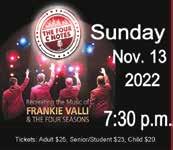
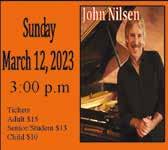


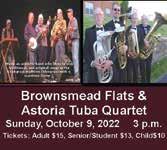
Find a unique gift! We have beautiful artisan cards, masks, jewelry, books by local authors, wearable art, original paintings, pottery, sculpture, photographs and so much more at your local Co-operative Fine Arts & Crafts Gallery.
Voted one of top 3 Galleries in SW Wash. Free Gift wrapping plus Layaway!
Shop Local Saturday (4th Saturday each month) to receive a free gift!
Lower Columbia Genealogical Society Public Zoom meetings 2nd Thurs. 6pm welcome to visitors, instructions, announcements. Program with guest speaker 7pm. For a Zoom link: lcgsgen@yahoo.com.
Community Yoga In-person M-W-F, 7:45–9am, St. Stephen’s Church,1428 22nd Ave, Longview, Wash. (enter via alley). Led by volunteers. Suggested donation $2 per session; donated to the church. More info: Ruth, 360430-0420.

Don’t worry, I’m not here to make any trouble. Just hoping to see some artists at work!






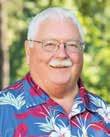




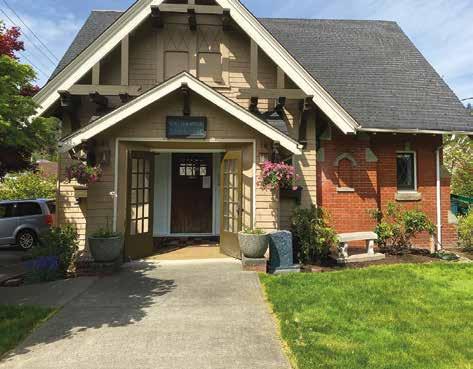

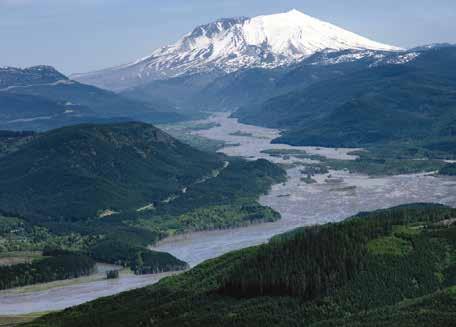



Gardening
Quiet Enjoyment
How to create sound barriers in your landscape
Story by Alice SlusherWhen we moved to the Pacific Northwest, we traded a quiet suburban Ohio neighborhood for two acres in a relatively remote spot at 1500 ft. elevation south of Kalama. We slept with our windows open, surrounded by the calming, heavenly ambiance of the wind rustling and whispering through the Doug firs and hemlocks.
Fast forward five years, we built a new home about 130 feet from a road that has become increasingly busy. Not only did we see the traffic and the headlights in our bedroom as cars rounded the curve, but the street noise was a constant irritant. We wanted an attractive but effective privacy hedge that would also work as a sound barrier. In addition, we wanted a planting that would be relatively carefree and deer-resistant once established. A tall order.
Plant choice is critical
Tall trees or shrubs with branches that reach the ground make the best noise barriers. The best trees or bushes are evergreen —ones that don’t lose their leaves in the winter, so you have year-round protection. That makes many conifers excellent choices. Arborvitae, with its tall, slender form, is used frequently, but unfortunately, deer find them irresistible. Drive around our area, and you’ll see deer-sculpted arborvitae—narrow and ragged up to five feet, then flaring out above the reach of their hungry mouths. Not an attractive look. Better choices might be Leyland cypress, spruce, fir, western red cedar, and hemlock.
A disease or insect problem could devastate the entire hedge if you plant only one variety. Plant a mix of trees and shrubs. If you’re in a hurry for your hedge, invest in more mature trees. But if you have a little patience, smaller, less pricey trees are a good option.
Programs & Events
Place your row of trees as close to the noise source as possible, usually along the roadway. Planting on a berm built up to four feet effectively uses the combination of soil and dense plants to reduce noise. Another idea is to erect a fence and plant the hedge on the street side for a double whammy against unwanted noise. A row of lower-growing dense evergreen shrubs on the street side of the living wall also helps to dampen sound, as does a planting bed of attractive ornamental shrubs on the house side of the barrier. Some of the best shrubs for sound abatement are carefree juniper, viburnum, and boxwood.
We didn’t have the option to plant on a berm. After researching and talking to local nurseries, we decided on Leyland cypress trees (photo, above). Once established (which means regular summer watering during the first three seasons), they are drought-resistant and relatively carefree. They are planted far enough from the house not to be a fire hazard and are fast growing — usually two to three feet per year. We planted them in a staggered row so their mature size would create a dense wall. Five years ago, we had spindly six-foot trees. We now have a solid, thick wall of deep green 30-foot trees that makes our home invisible from the street, and we have very little road noise. We will likely create a planting bed in front of them

OSU Extension Columbia County • 503-397-3462
Sept. 20 6:30pm-8pm. Chat with Chip: Interactive Zoom program. Register in advance online; you will receive a confirmation email with info to join meeting. Call for topic: 503-39973462. Other programs: extension.oregonstate.edu
WSU Extension Cowlitz County 304 Cowlitz Way, Kelso, WA 98626
Free Zoom Workshops. Tues., noon online. 360-577-3014 X3, for connection info. Info: cowlitzcomg.com/events)
Sept 20 Putting the garden to bed Sept 27 Moles
Oct 4 Composting - The Easy Way Oct 11 Planting Bulbs
In-person workshop (registration required): Oct 8 Harvesting Mason bees (10am – Noon)
Oct 13 Worm Composting (6:30pm)
and choose flowering shrubs and some small trees with fall colors that we can enjoy from our windows. I also have my eye on some unusual evergreen shrubs to add to our sound buffer and be a lovely addition to our landscape.
Autumn is a great time to plant trees because the ground is warm, and the winter rains will help the roots to establish. If you’ve been wishing for a quieter, more private space, now is the time to do it.
Kalama resident Alice Slusher volunteers with WSU Extension Service Plant & Insect Clinic. Call 360-577-3014, ext. 1, or send question via cowlitzmastergardener@gmail.com.
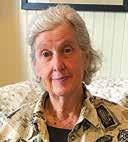

Slant
Chinaware Recycled
Early impressions; travel through time and culture via art
By Vyette O’Neill RaynhamIhave always liked blue and white porcelains, probably thanks in part to my French grandfather, Corentin Louis Horellou. When he worked as a night watchman for Meier & Frank department store in downtown Portland in the store’s early days, he added, in his own way, to my family’s ceramic collection.
From time to time a piece of “Chinaware” would be broken at the store and my grandpa was given the pieces to take home. He glued the broken dishes back together and developed a ceramic collection of his own, encouraged by Grandma H.
Their recycled collection included some of the most popular early dishes found in American and European homes in the late 19th and early 20th centuries; “Chinaware,” like Delft and Spode, were decorated with blue and white porcelain glazes influenced by early imports from China.

As an art historian and instructor in this field for more than 50 years, it has been my great pleasure to travel the world and experience its varied artistic expressions. Travel, one of the best educational experiences, is always a lesson on how the arts and designs — from “folk art” made by hand with simple
Many ancient Chinese blue and white porcelains influenced the decoration of porcelains around the world, such as these pieces by Spode.


tools for everyday use, to “fine art” made for aristocracies — are made to be useful and bring pleasure in every culture on earth.
One of my most interesting “trips” took place right here in Longview, Washington in 2006, when I went to the Orient, via the Minthorn Collection of Chinese Art.
As I was asked to curate, design and install the Collection, I spent a lot of time with Anne Minthorn and the
artworks themselves when the collection was donated to Lower Columbia College (see story, page 29). She and her husband, Dr. H.H. Minthorn over a 50year period had collected key pieces of Chinese art. Their art is a travel through time and culture and was generously given to LCC, intended to be enjoyed by the community LCC serves. What a wonderful gift to us all!
Yvette O’Neill Raynham was an instructor of art education and art history at Lower Columbia College for more than 20 years and taught Arts of Africa and the African Diaspora part-time at a variety of colleges after retirement. Her idea sparked the Community Arts Workshop and the Alcove Gallery launched in 2018 at CAP in Downtown Longview. The arts workshop had been a dream of hers for some time, and she continues to be involved there.
Imagine less joint pain and better mobility.
From fingers to toes, the stellar staff at LOA has the skill and experience to handle all of your orthopedic needs.
If you’re having problems with your hips, knees, shoulders, ankles, feet, wrists, or hands the staff at Longview Orthopedic Associates can provide the help you need.
Specializing in arthroscopic surgeries and joint replacement procedures, Bill Turner, Jon Kretzler, Peter Kung, A.J. Lauder, Jake McLeod, Tony Lin, and Mike Henry treat virtually every problem affecting bones, joints, muscles, tendons, and ligaments.
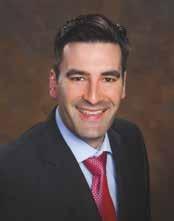


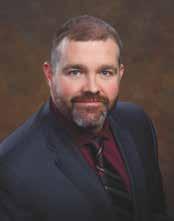
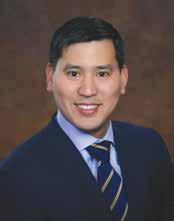


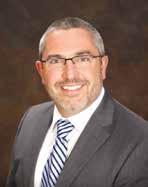
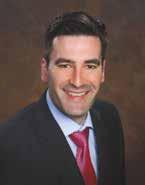
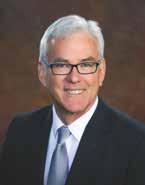
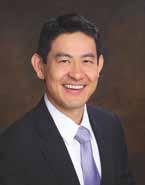
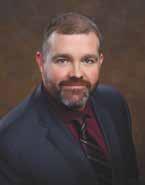
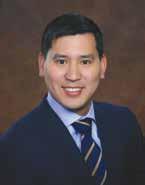


Bill Turner, Jon Kretzler, Peter Kung, A.J. Lauder, Tony Lin, and Jake McLeod have performed tens of thousands of joint procedures. From arthroscopic surgery to joint resurfacing, reconstruction, and replacement, the talented team at LOA has the skill and experience to get you back to living your best life.
Call today to schedule an appointment.
Don’t allow joint pain to affect your quality of life. Call today to schedule an appointment.
We welcome Kaiser patients with a referral!
We welcome Kaiser patients with a referral!
Longview Orthopedic Associates Provides Comprehensive Care www.longvieworthopedics.com


LOA Offers Joint Care from Fingers to Toes www.longvieworthopedics.com 360.501.3400
Miss Manners from
a cane. My parents are the type to tell me to “walk it off,” even though a cane would help me a great deal with my pain.
Do you have any suggestions for some words to use when bringing up the subject with my parents? Is “Hey, this thing helps me and I’d like to use it, even if you think it’s only for the elderly” sufficient?
GENTLE READER: Actually, Miss Manners has two words for you: walking stick. Time was when a walking stick was considered a chic accessory for both ladies and gentlemen, unrelated to any usefulness it might have provided. Take a look at antique sticks -- some have built-in compasses, flasks, watches, powder compacts or, if people get really annoying, swords. You could start a new fad.
Miss Manners is not encouraging you to attack your parents. But they do need a good talking-to about your mobility being more important than ridiculous -- not to mention ageist -- concerns about what others think.
DEAR MISS MANNERS: I am female, but I have an androgynous name often associated with a dog or a male. I work with the public, and many times I am confronted with rude questions, such as, “You’re named after a dog?” “Did your parents hate you? Why are you named that?” “What is your real name?” and so on.
I struggle to find an appropriate answer, as I do not want to sound rude, but am tired of people insulting my name.
GENTLE READER: “Yes, my given name is Pooch” followed by a pleasant but defiant smile that says, “You got somethin’ to say about it?”
Please send your questions to Miss Manners at her website, www.missmanners.com; to her email, dearmissmanners@gmail.com; or through postal mail to Miss Manners, Andrews McMeel Syndication, 1130 Walnut St., Kansas City, MO 64106.
Your coLumbia rivEr rEadEr
Read it • Enjoy it Share it • Recycle it
Columbia River Reader is printed with environmentally-sensitive soy-based inks on paper manufactured in the Pacific Northwest utilizing the highest percentage of “post-consumer waste” recycled content available on the market.


Series on “civil dialogue” continues at LCC By Alan Rose

An experiment in community civility is underway with a fivepart series “Community in the Crossfire: Seeking Civil Dialogue in Uncivil Times.” The forums are a nonpartisan exercise in exploring divisiveness in our community and modeling respectful dialogue by bringing together people of different viewpoints to debate some of the community’s most pressing and divisive problems.
A group of concerned local citizens partnered with Lower Columbia College to host the series. Each 90-minute forum, moderated by retired Superior Court Judge Stephen Warning, features four panelists.
The third series will take place Thursday, Sept. 22, at 7:30pm in LCC’s Health and Science Building along Maple Street, behind the Longview Library. The forum will also be available through Zoom using the link on the series’ web site: civil-dialog.com/ and will be recorded and broadcast later by KLTV on Channel 29.
The forum will focus on homelessness and explore ways to address the problem. The panelists will be former Longview Housing Authority board member Jo Brewer, Niki Favella, property manager for Catlin Properties; Love Overwhelming counselor Ha’im Sharif; and Joseph Govednik of the Kelso Business Association. Retired LCC psychology instructor Michael Strayer will provide context and an overview to the issue.
The first forum explored the causes of political divisiveness and suggestions for overcoming it, and the second forum addressed how to protect the environment while building the economy, and ways to get past the jobs vs. environment tension that has charged public debate on recent industrial proposals. Both forums can be watched on Youtube and on KLTV with links at civil-dialog.com.
The fourth forum of the series, focusing on the decriminalization of drugs, takes place on Oct. 6. The focus of the fifth and final forum, scheduled for Oct. 22, has yet to be determined.
More info: www.civil-dialog.com.

the spectator by ned piper
Save the Queen!
When my friend Paul Thompson and I planned our 1960 trip to Europe, we decided to visit a foreign country before embarking. Vancouver, B.C., Canada, seemed like a logical choice. While there, we attended a stage play. Before the curtain rose, a recording of the song “America” (My country ‘tis of thee) was played. Paul and I assumed it was a greeting to the Americans in attendance. Later, we learned it was actually, “God Save the Queen,” as Canada shares the British sovereign.
I reflected on this with Queen Elizabeth’s passing. Since I left for Europe a month before Paul, we had planned to meet on a certain date at Number 10, Downing Street, London. As it turned out, Paul was delayed in Ireland, later joining me in Germany.
While in London, I visited Buckingham Palace. A Brit pointed out to me that the flag flying above the Palace indicated the Queen was inside. I didn’t see her, but did witness the changing of the Royal Guard, a magnificent tradition.
In the mid-eighties, Sue and I vacationed in another British Commonwealth country, Australia. While in Brisbane, I attended a Rotary meeting. It was a noon meeting. Members of the club greeted me with gracious enthusiasm. Unlike our local Rotary meetings, the Aussies began theirs with a robust cocktail hour. They bought me a glass of wine, asked me to draw the winning ticket for the weekly lottery and invited me to sit at the head table. I was introduced and moments later the membership rose from
their seats and raised their drinks in my direction. I felt honored. Honored, that is, until the club President shouted, “God save the Queen!”
I turned around and there, mounted on the wall behind me, was a photograph of Queen Elizabeth.
CNN has done a great job of covering her sense of humor. One cute story came from her security man. The moment occurred at Balmoral Castle. The Queen was taking a walk outside the castle walls. A group of Americans approached, not realizing who she was. They snapped pictures of this little old lady, asking if she’d ever seen the Queen. She said, “No, but he has,” referring to her security man.
Longview resident Ned Piper coordinates advertising and distribution of CRR, and enjoys the opportunities to meet and greet friends, both old and new.


PLUGGED IN TO
COWLITZ PUD

 By Alice Dietz
By Alice Dietz
What’s the big deal about hybrid water heaters?

Ahybrid water heater provides the same supply of hot water you’ve grown accustomed to, but with less cost!
Hybrid water heaters save a lot of money and energy when they are in heat pump mode, which means they need a lot of air to operate properly. A hybrid water heater needs to be installed where it has access to 700 cubic feet of air; this is equivalent to an 8’x10’ room. Garages are the ideal place, but you can install them in your basement, as well. Mechanical closets are not
typically going to be good options unless you vent the water heater to get air from outside. Vent kits are available at most hardware stores.
Cowlitz PUD offers a $600 rebate if you replace a standard electric water heater with a hybrid water heater.

We do not require you to have your water heater installed by a licensed contractor. There is a video on our website at www. cowlitzpud.org if you want to see how to install one.
• Save money by ordering from Cowlitz PUD’s website




• Free delivery to residents of Cowlitz County
• 10-year warranty
• Easy to install (or use one of our Courtesy Contractors listed on our website www. cowlitzpud.org )
Make the switch to a new hybrid water heater!
Alice Dietz is Cowlitz PUD’s Communications/Public Relations Manager. Reach her at adietz@cowlitzpud.org, or 360-501-9146.

one child already taken “their share”?









Center & Museum The Dalles, Ore.
Debby NeelyGable, “Coast Chronicles,” Chinook Observer, Long Beach, Wash.
